Archived Blog Posts
5 Types of Water Damage Testing Equipment: SERVPRO of Cherokee County
3/11/2022 (Permalink)
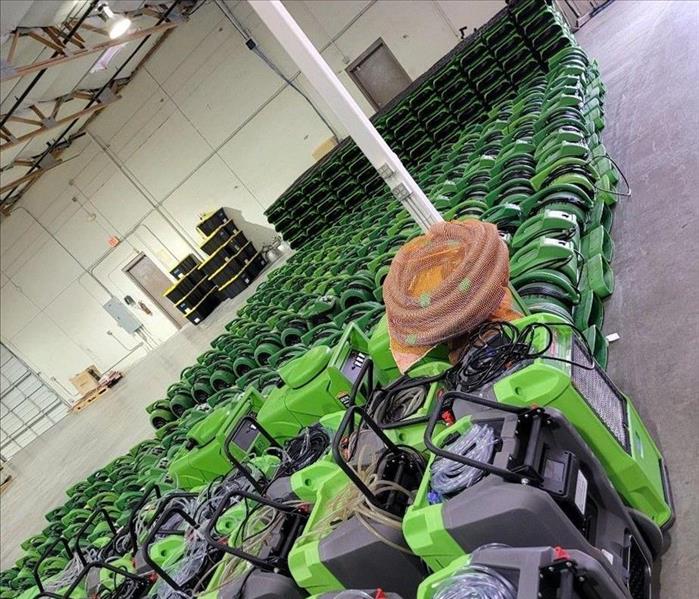 SERVPRO of Cherokee County is ready to respond to your water damage restoration call immediately when you need us. Call today!
SERVPRO of Cherokee County is ready to respond to your water damage restoration call immediately when you need us. Call today!
Because water damage can often reach areas you can't even see, our SERVPRO of Cherokee County technicians use several types of testing equipment to help you restore your property damage in Woodstock, GA and throughout Cherokee County "Like it never even happened." This equipment is used to analyze environmental conditions, test all types of building materials for potential water damage, and track the drying efficiency of the emergency water damage restoration process. Here are a few of the machines our team utilizes:
- Moisture Meters: Moisture meters are one of the most common pieces of water testing equipment. These meters such as the Dri-Eaz Protimeter SurveyMaster measure the moisture level of an environment or material and provide a digital reading on the device's screen. By using moisture meters, our technicians can quickly test whether any materials in your home are affected by water damage so they can then begin taking steps to dry them out. They are used to test everything from drywall, wood, siding, tile, insulation, carpeting, and everything in between.
- Voltage Meters: Because emergency water damage restoration equipment can require significant electrical power, voltage meters are used to ensure that the equipment is being operated safely. These meters measure the voltage of an electrical circuit and help our technicians avoid any potentially hazardous situations.
- Thermometers: In order to better understand how water damage is affecting different areas of your property, our team uses thermometers to take temperature readings both inside and outside of walls, floors, the air inside and outside of the affected areas, and more. Temperature is an important part of our local water damage restoration process because it helps our restoration technicians determine and control the speed of the water damage drying process.
- Infrared Meters: Because Infrared meters see temperature differences between different building materials, they are often used to scan for hidden water damage that might otherwise be missed. A common misconception about Infrared meters such as the Flir E6 is that they are used to see behind walls. This is not the case. However, our SERVPRO of Cherokee County technicians use them along with our other testing equipment to help demonstrate and determine the potential extent of water damage and required removal of affected materials. They can also be used to identify other existing electrical, mechanical, and building issues.
- Air Sampling Equipment: Air sampling is also an important part of the local water damage restoration process because it helps our SERVPRO of Cherokee County technicians identify and quantify any biohazards in the environment, such as mold spores, lead, pollen, insect parts, skin cell fragments, fibers, and inorganic particulates. By taking air samples inside and outside of the affected areas, our technicians and indoor air quality experts can determine whether or not specialized restoration processes are required.
SERVPRO of Cherokee County is here to help you restore your property damage "Like it never even happened." If you have any questions about our water testing equipment or the emergency water damage restoration process, please don't hesitate to give us a call at (770) 924-3848. We're always happy to help!
3 Easy Ways to Prevent Frozen Pipes
2/21/2022 (Permalink)
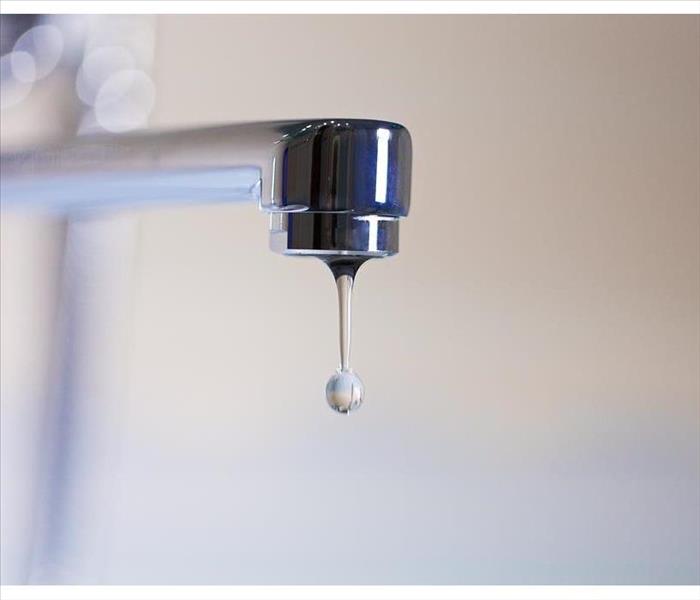 Let faucets drip.
Let faucets drip.
Prevent Your Pipes From Freezing
Frozen pipes can lead to a lot of damage around the house. Not only will you be unable to get water through certain faucets, but the pipe can burst entirely, causing a flood. You need to seek out water line repair in Canton, GA as soon as you notice your water system not working the way it should. However, one option better than that is to simply prevent your pipes from freezing in the first place.
1. Keep the Heat Running
Homeowners may be hesitant to leave the heat running all day long even if people are going to be gone, but the slight increase in the power bill is well worth it to prevent frozen pipes. Bursting pipes can cause a lot of damage, especially if the water floods a room with a lot of valuables. A house does not have to be kept at a particularly high temperature. As long as a home’s interior is at least 50 degrees Fahrenheit, it should be fine.
2. Prop Open Interior Doors
If you are going to run the heat all day, you want to be certain you are getting the most out of it. Leave all the interior doors open so that heat can flow easily from one room to the next. This includes cupboards in the bathrooms and kitchen.
3. Let Faucets Drip
The main cause of frozen pipes is a buildup of pressure in the system. Homeowners in Canton, GA can relieve some of this pressure by letting faucets drip throughout the day. You should ordinarily address dripping like this as soon as you can, because it can increase water bills. Similarly to keeping the heat running, the small increase is well worth it to prevent more catastrophic damage. In the event your home does develop a burst pipe, then you’ll need to contact a professional service to repair the pipes and dry the affected room.
Clothes Dryer Safety Tips to Prevent Fires
2/14/2022 (Permalink)
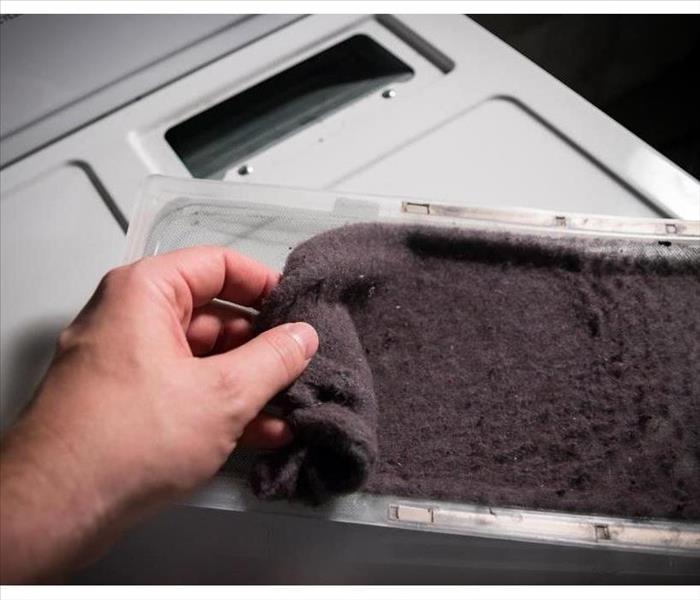 The lint trap should be cleaned between all loads of laundry.
The lint trap should be cleaned between all loads of laundry.
Keep Your Home Safe From a Dryer Fire
Clothes dryers are involved in thousands of house fires each year, and the highest number of these occurs in fall and winter. The majority of these fires start because the dryer is not cleaned and maintained properly. Luckily, there are some simple tips available to help keep your home in Woodstock, GA, safe from a dryer fire.
1. Installation
Using the correct electrical outlet and plug to hook up your dryer is essential. To ensure that installation is completed properly and safely, consider calling a professional to connect your dryer. Like all electrical appliances, dryers come with warnings and instructions from the manufacturers, and you should read over these carefully.
2. Cleaning
The lint trap should be cleaned between all loads of laundry. The back of the dryer should also be cleared, as lint can build up in this area. Every few months, the vent pipe or exhaust should be emptied using a plumber’s snake in order to avoid a lint fire.
3. Proper Use
Using your dryer properly can also protect your home from a dryer fire. Avoid overloading your dryer with too much clothing at once. Do not dry items with rubber, foam or plastic, such as bathroom mats with rubber backing. Never place clothing with oil, gas, alcohol or any other flammable chemical in your dryer. Always turn the dryer off before going to bed or leaving your residence.
4. Maintenance
Routinely inspect equipment parts, such as the venting system, to ensure that there is no damage or build-up of lint. Keep the area around the dryer clean and free of anything flammable. Check outside venting for blockages, such as birds nests. Unplug or disconnect the dryer if you will be away for an extended period.
A dryer or lint fire is almost completely preventable, but homeowners must take proper precautions. If your residence has been damaged in a dryer fire, don’t hesitate to reach out to a fire restoration service today.
Commercial Property: Flood Recovery and Financial Responsibility for Tenants
2/2/2022 (Permalink)
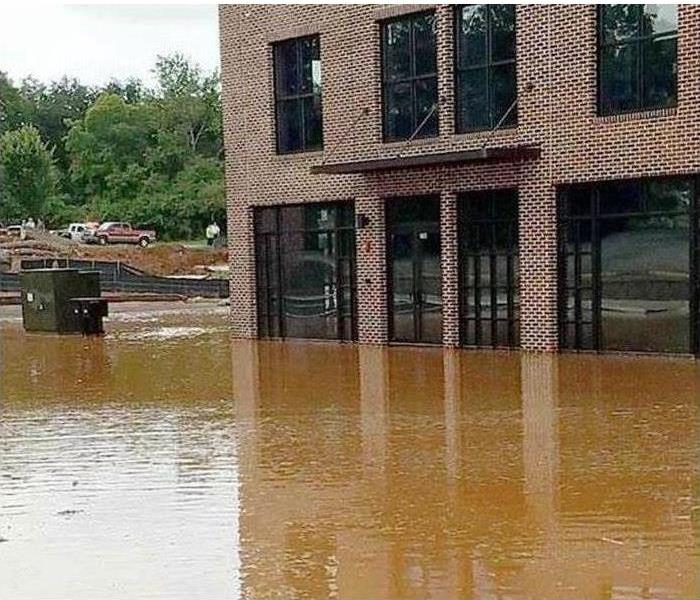 Flood damage in Free Home, GA.
Flood damage in Free Home, GA.
Flood Recovery and Financial Responsibility for Tenants
If your business is run out of a leased facility, you may be wondering what your financial obligations are after a flood or significant water damage. While business and renter's insurance will help you through the inevitable business interruption, there is the bigger picture of culpability and responsibility. Most of the answer depends on where you live and your lease agreement.
1. State Regulations
Most states require property owners to have commercial insurance coverage, and they also hold property owner’s accountable for repairs. However, depending on where you live, owner’s may be able to share responsibility with tenants under certain circumstances.
2. Lease Agreement
You may also want to review your lease agreement because there may be line items that refer specifically to water damage and who is ultimately responsible for the repairs. Your renter's insurance provider may be able to help you understand your rights as a tenant as well.
3. Personal Property
In most states, the property owner is responsible for the structure of the property, and the tenant is responsible for their personal property. In regards to businesses operating out of leased facilities, this means that the owner is responsible for the facility and you would be responsible for damaged equipment, which is likely covered under your business policy.
4. Restoration
While the owner’s property policy likely covers restoration work involving the structure of the facility, any damage done to your business, like inventory and equipment, is considered a personal business loss and will likely be covered by your insurance. You can contact your insurer or a disaster restoration specialist in the Free Home, GA, area for more details.
A flood is devastating for a business, but especially when that business operates out of a leased space. In most states, the property owner is responsible for structural issues while your business and renter's insurance is responsible for personal property losses.
Think Fast About Broken Pipes
1/26/2022 (Permalink)
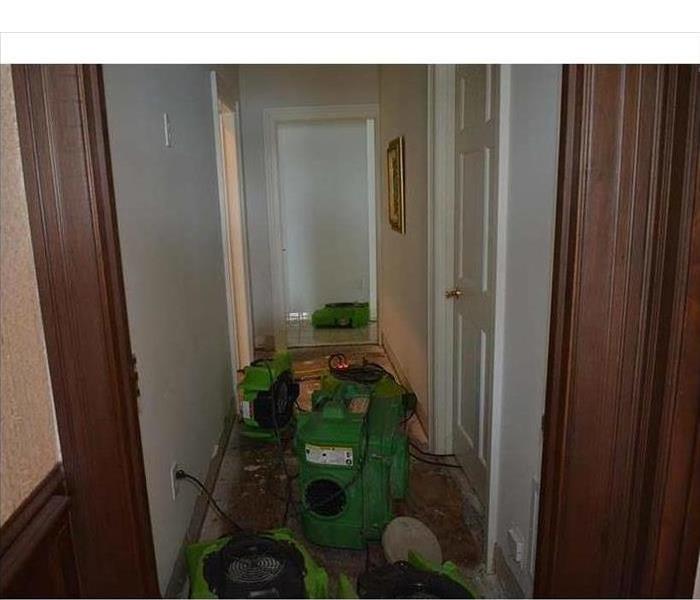 Fans and dehumidifiers will help remove water and any remaining moisture.
Fans and dehumidifiers will help remove water and any remaining moisture.
Steps To Fix a Bursting Pipe In Your Home
It always seems like an unexpected disaster happens on a day when you really don’t have time to deal with it: when you are scheduled to lead a presentation with a client, when you have to pick up the kids from school, or when you are heading out for vacation. Here are some tips so you can prepare to think fast when you have bursting pipes in your home in Oak Grove, GA.
Complications Happen Fast
The trouble with bursting pipes and other unsuspected leaks is that damage quickly goes from bad to worse:
• Wood and paper materials can be structurally damaged the longer they are left in water.
• Staining can take place when wet materials are allowed to sit against carpet or other items.
• Metal materials can start to corrode.
• Exposure to time and temperature can turn clean water into harmful “gray water”.
• Mold can start growing in about 48 hours.
Don’t delay and get started with the cleanup. Everything else can wait.
Phone a Friend for Fast Help
You may actually need to phone two friends: one to pick up your kids or do your presentation, and one professional water mitigation specialist that understands the need to act fast to fix the broken pipe and clean up water. Turn off the water so your bursting pipe doesn’t continue spraying water all over your home. It’s amazing how quickly water starts to accumulate.
The call you make to the expert will be most useful for resolving your bursting pipes quickly. The right professional will have knowledge, experience and special equipment to help you resolve the flood. Pumps, vacuums, fans and dehumidifiers will help remove water and any remaining moisture to minimize damage and prevent secondary trouble such as mold growth.
You’ve Got This
Now that you know what to expect and who to call, you can think fast during an emergency and help minimize water damage in your home.
The Riddle of Water Damage After a Fire
1/21/2022 (Permalink)
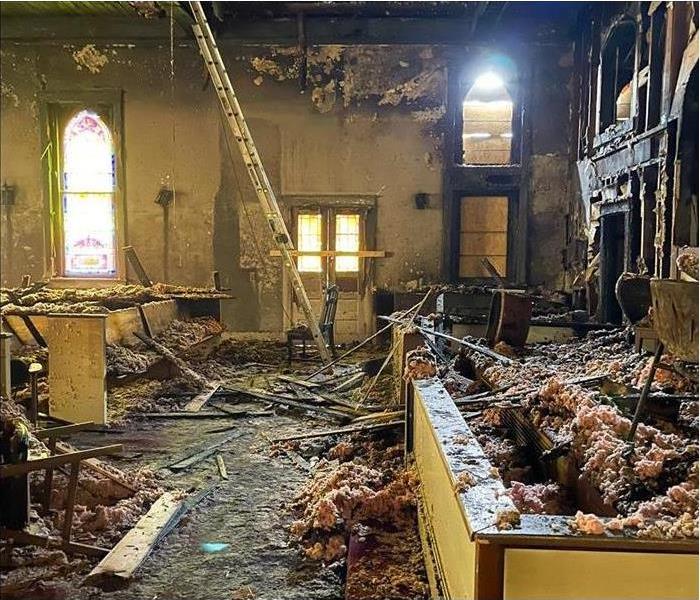 Fire and water damage to a building in Nelson, GA.
Fire and water damage to a building in Nelson, GA.
The Aftermath Of a Fire
The flames billow during a fire in Nelson, GA, and nothing is more welcome than the fire fighting crew with the pressurized water hoses and chemical retardants being sprayed onto the roof of your commercial building. As the flames die down, an inspector can then inform you the building is safe to reenter. That is when you notice the fire damage and water - so much water. How can you begin to deal with all that unexpected water? Try these three steps.
1. Contact a Professional
Fire and smoke restoration professionals can quickly begin work on removing the water from your building once the fire marshal, inspector or deputy allow entrance. By beginning the cleanup process as quickly as possible, future mold and mildew problems can often be alleviated.
2. Look for Water
An average fire hose can supply up to 24 gallons of water a minute when fighting a fire. That means that in 30 minutes, the hose is shooting out enough water to fill an average swimming pool with about 18 inches of water. Along with fire damage, water pressure often breaks windows, tears through doors, and enters ceiling holes. Water may find its way into unexpected places such as inside electronics, under wooden floors, and inside walls. Looking for water damage in hidden places can save time and money.
3. Create Air Flow
After removing as many of the porous items from the water as possible, and once the professional team has removed the majority of the liquid, create a method of air circulation and ventilation. Your fire restoration team may offer industrial blowers, dehumidifiers and air moving fans, but if they do not, it is still important to get the air moving to remove excess moisture from the building. This can help prevent mold and mildew, warping floors, and bulging walls.
Fire damage often includes hundreds of gallons of water. Knowing what the possible scenario is in the aftermath of a fire can help you be prepared for the unexpected. Too much water can be a bad thing, especially when it is on the floor of your commercial property.
Fire Risk In Your Commercial Office? Try These Tips
1/20/2022 (Permalink)
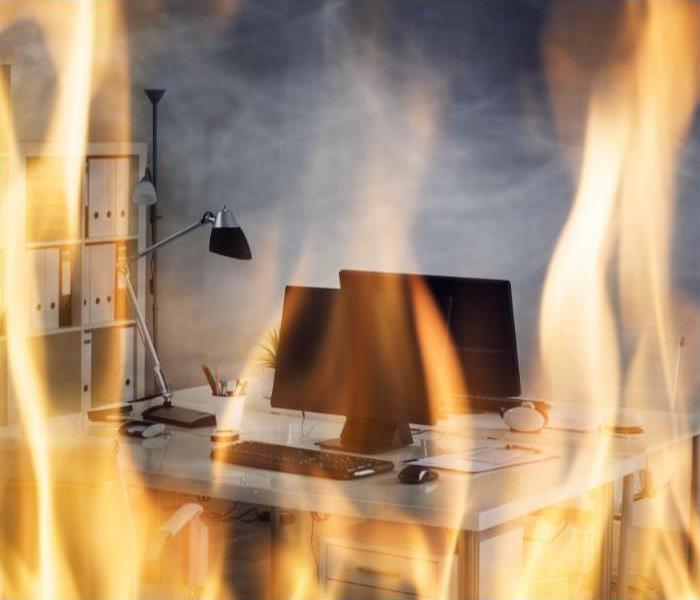 Office Fire
Office Fire
Our homes and our businesses in Towne Lake, GA or Holly Springs, GA are our castles, which is why we work hard to make them as safe and secure as possible. Unfortunately, there are some hazards that may not be obvious and can cause damage to your office, in the form of fire or water damage. Even more unfortunate? The cost of these damages, which could run into the thousands of dollars, and can come out of your pocket—whether you’re an individual homeowner or a business owner or landlord. Here are some common causes of fire and water damage in commercial office buildings, as well as tips on how to prevent them from occurring and damaging your home or commercial property.
Understanding Building Fire Damage
Most office building fires are small. But even a small fire can do a lot of damage if it gets out of control or isn’t contained early on. One of the biggest dangers is smoke and fire damage to your home or commercial office's interiors. Smoke can permeate materials, carpets, walls, flooring, ceilings—even drywall joints—leaving hidden danger behind long after flames have been extinguished. Even if you can’t see any visible signs of fire or smoke damage, you should always have an experienced professional examine your property for lingering toxins from before you move back in.
According to this report by the NFPA, there are 7 main causes of fires in commercial office buildings. Cooking Equipment, Electrical distribution and lighting equipment, heating equipment, intentional damage, smoking materials, exposure to other fire sources, and electronic, office, or entertainment equipment. This statistic includes general business offices, banks, veterinary or research offices, engineering, mailing firms, and post offices.
Common Causes of Commercial Building Fires
Most office fires are caused by cooking equipment, accounting for slightly over one in every four commercial office fires. However, while these fires are the most common, they do not account for most of the property damage to office buildings. That position is taken by the intentional damage category. Intentional damage alone accounts for a full 20% of commercial fire property damage. Intentional Property Damage occurs when a person seeks to purposely damage the office property through arson.
Two other leading causes of fire in office buildings are heating equipment, electrical distribution, and lighting equipment. Together, they account for 18% of property damage to commercial office buildings. These can include things such as space heaters, light fixtures, electrical wiring, outlets, electrical appliances, extension cords, and more.
While lower on the list, smoking materials, electronic, office, or entertainment equipment account for 12% of commercial office property damage.
Lastly, exposure fires, as defined by the National Fire Incident Reporting System (NFIRS), are fires resulting from another fire outside of the commercial building itself. This kind of commercial fire damage accounted for 18% of property loss.
What Can I Do To Prevent A Building Fire?
If your building was constructed with modern building materials, fire damage should be a rare occurrence. But it can still happen if you’re not careful. Make sure all smoking materials are safely extinguished before leaving work each day. A smoldering cigarette can ignite more easily than you think. Also, make sure to regularly inspect your smoke alarms, carbon monoxide detectors, and fire suppression systems to ensure they’re working properly. If a smoke alarm goes off for no reason at all, make sure to replace or recharge its batteries immediately.
The NFPA uncovered another intriguing statistic about fires on weekends and between the nighttime hours of 7 pm and 7 am. 19% of fires occurred on weekends but accounted for 31% of fire-related property losses. Meanwhile, fires at night accounted for less than one-third of office property fires, yet caused 67% of direct property damage due to fires.
Automatic Fire Detection & Fire Extinguishing Systems: This shows that one of the most important steps you can take towards protecting your office building from fire damage is to install and maintain automatic detection and fire extinguishing systems.
Camera monitoring systems such as those installed by videosurveillance.com or Pelco would be best for large-scale commercial properties. Otherwise, self-installed solutions such as those recommended in this article by PC Mag will work well.
For fire suppression systems, the best solution is to pay a proper fire protection services consultant such as Fire Protection Services LLC. Make sure to ask them to help you develop and implement a fire suppression system maintenance plan.
Cooking Equipment Fire Prevention: The best way to prevent fires with cooking equipment is to train your staff properly in its use, cleaning, and maintenance. For more on cooking equipment fire prevention, be sure to refer to our article called Reduce Fire Risk in Your Commercial Kitchen with These Quick Tips.
Electrical Hazards Fire Prevention: When it comes to electrical distribution and lighting equipment, there is a multitude of reasons why fire may start. But according to this article by firerescue1.com, faulty outlets or appliances, light fixtures, extension cords, space heaters, and wiring issues were the 5 most common electrical fire causes.
To prevent faulty outlet or wiring fire hazards, the first step is to make sure to have a certified electrical contractor or property inspector review your commercial property before purchase. Even if you or a tenant are already occupying your commercial office space, a proper inspection by a certified electrical contractor to ensure code compliance of all building materials and installations will protect you from potentially expensive fire repairs. This is especially important to protect you from having to pay for potential property damages out of pocket.
To protect your commercial property from fire damage due to light fixtures or extension cords, the most important tip is to ensure you follow the manufacturer's maximum recommended wattage and amperage guidance.
A good rule of thumb for selecting an extension cord is the smaller the wire gauge rating, the greater the capacity. According to this article by the Spruce, 12-gauge extension cords can handle up to 1920 watts (16 Amps), 14-gauge cords can handle 1440 watts (12 Amps), 16-gauge can handle 840 Watts (7 Amps), and 18-gauge cords 600 Watts (5 Amps). In addition to wattage capacities, another thing you should look at when choosing a commercial electrical power solution is cord lengths. The longer the cord, the more important it becomes to have a higher wattage extension cord.
For light fixtures, you should follow manufacturer guidelines to prevent property fire damage. However, what you should look out for are potentially dangerous light bulb wattages and materials around your lighting fixtures that could catch fire. High-wattage incandescent bulbs installed on light fixtures that are rated for lower-wattage bulbs can spark flames because of overheating. Also, keeping flammable materials around light fixtures, or allowing dust buildup increases the risk for fire damage.
Call SERVPRO of Cherokee County to Restore Commercial Fire Damage
We hope these tips are useful to help you protect your commercial property from fire damage. In case you experience a property loss in your commercial office building or commercial property, our team at SERVPRO of Cherokee County is available to help 24/7/365. Call us today at 770-924-3848 for rapid assistance.
The Flood Cut: Cutting Your Way Toward Restoration
1/12/2022 (Permalink)
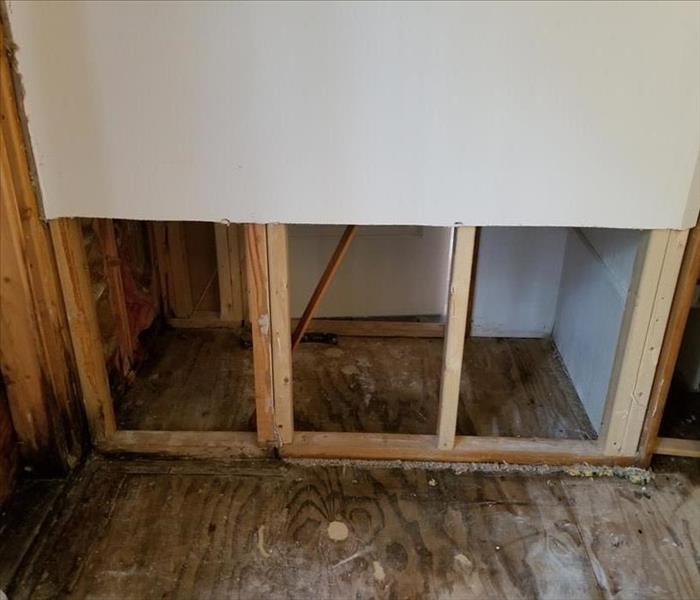 A flood cut was performed in a home in Lebanon, GA.
A flood cut was performed in a home in Lebanon, GA.
The Flood Cut
Flooding in your home is an emotional roller coaster and one that doesn’t end when the water recedes. The restoration process begins with property removal and the dreaded flood cut, which can leave many homeowners feeling like the restoration process is moving backward instead of forward.
1. What Is a Flood Cut?
A flood cut is a process of exposing wall studs to allow your home structure to dry without the worry of spreading mold and mildew. In order to reveal the studs, a cut must be made above the flood damage, about 12-18 inches, accounting for moisture absorption in the framing and insulation.
2. When Is It Necessary?
Flooding does not always consist of clean water. When a flood is caused by sewage or other polluted water, a flood cut is necessary to avoid contamination. The cut allows crews to remove affected insulation, drywall, and even studs to ensure the health and safety of you and your family.
3. Can It Be Avoided?
If the floodwater is clean water, then it is possible to avoid cutting open your wall, but only if the affected wall does not have insulation. In this instance, crews can drill several small holes into the affected drywall and insert flexible air hoses which used to pump dry, warm air into the cavity, drying the studs and drywall.
4. Is It a DIY Project?
You can try to perform a flood cut on your own, but if the floodwater was composed of sewage water, then it may be a better idea to call emergency restoration services in the Lebanon, GA, area. Sewage water is considered black water, and it presents many health risks to you and your family.
Flooding can cause a lot of damage structurally and personally, but a flood cut should not be looked at as furthering that damage. A cut is actually a step in the right direction, a step toward restoring order in your home, and while you may be able to perform this task on your own, be sure always to consider your safety first.
We’re Ready Around the Clock | SERVPRO® of Cherokee County
12/30/2021 (Permalink)
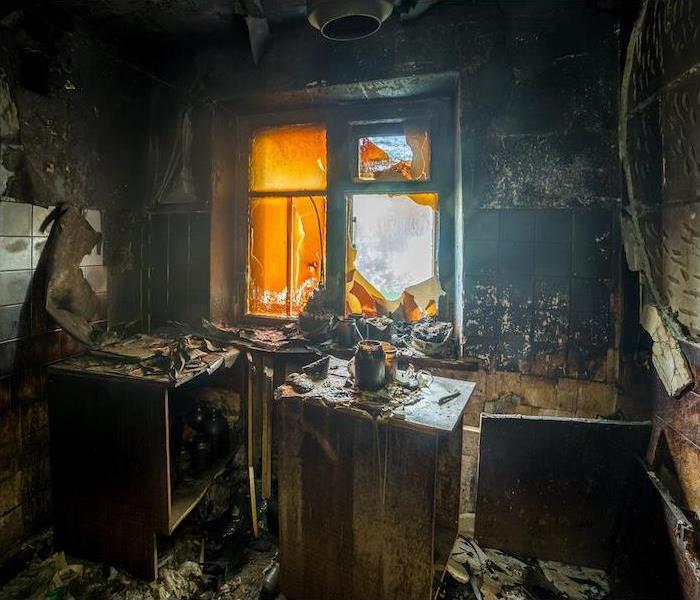 Fire damaged kitchen with soot on walls and burnt cabinetry
Fire damaged kitchen with soot on walls and burnt cabinetry
If you remember rotary phones in homes and “blue light specials” at the local big-box store, then it’s likely you’re old enough to remember a time when we did much more of something we hardly ever have to do now: waiting.
Remember sitting in a doctor’s office with nothing to do but twiddle your thumbs or check out a three-year-old magazine? Now you can video chat your physician from home while you play video games in the background.
So much of our lives is instant now, and that’s a good thing—especially when it comes to the urgency of home damage. If something happens in the night or on a weekend to create an acute need for service, you shouldn’t have to wait. And with SERVPRO’s world-class, 24-hour emergency services, you won’t have to.
Fast service and quick action matter, and here’s why.
After a fire. Fire does much damage in the immediate, that’s plain to see. But soot, the sneaky discharge created when combustion goes uncompleted, works behind the scenes to create even more damage, and it starts only minutes after the fire.
Soot and smoke combine to create stains and smells for which there is a very limited window for repair. Once that window passes, the only recourse is to completely reconstruct affected walls to get rid of them. It’s doable, of course, but having SERVPRO on the scene right away will save you time, money and smelly clothes.
After water damage. It’s hard to miss the puddled water and dripping after a burst pipe, but it’s easy to overlook the fact that 48 hours after water comes in contact with your surfaces, mold starts growing. Mold growth presents a threat to both your health and, eventually, even the structure of your home. The faster your home can be dried and dehumidified, the better off you’ll be.
If storms or natural disasters happen in the night or on the weekend, you’ve got a sudden, acute need, and you shouldn’t have to wait until 9 a.m. the next business day to get help. When time is of the essence, we’re ready to act.
You shouldn’t have to wait for help, and when you link up with us, you won’t. Trust the team that’s Faster to Any Size Disaster. Trust SERVPRO.
When you need help after a home or business disaster, fast service is a priority, and there’s nobody faster or more prepared than SERVPRO. Call us anytime to take advantage of our 24-hour emergency service.
How to Respond to a Basement Flood
12/28/2021 (Permalink)
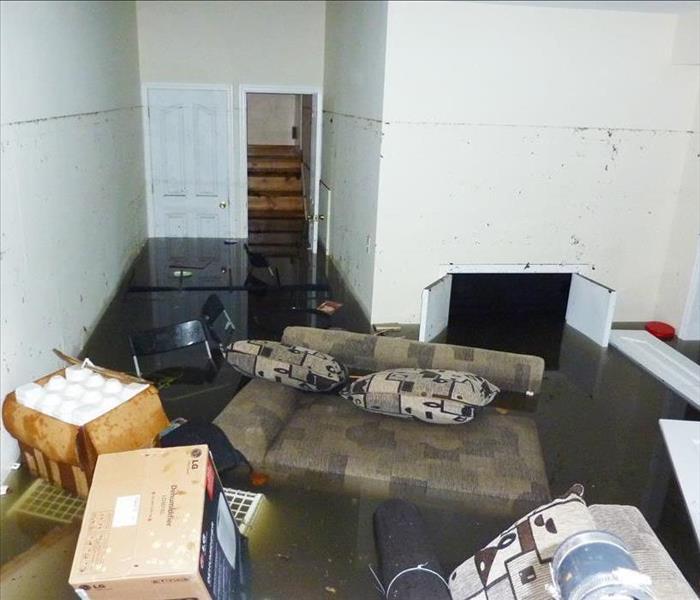 A basement flood in Acworth, GA, can be a catastrophic event.
A basement flood in Acworth, GA, can be a catastrophic event.
How to Handle a Basement Flood
Under normal weather conditions and with a functional sump pump, a basement flood is a rare event. However, one should still be prepared to handle such a situation should it arise, given that the speed of response can directly affect property values and environmental conditions in the home.
1. Personal Safety
In the event that it becomes necessary to enter the flooded area, a number of precautions will be necessary. If the amount of water is lower than a few inches, making temporary walkways out of cinder blocks and boards may be enough to allow you to reach pertinent areas and begin the process of removing the remaining water. However, if the situation is severe and the electric and gas systems have been compromised by water intake, it is best to have these systems disabled in order to reduce electrocution and fire risks. Standing water can also incubate disease, so boots, gloves and respirators are advised during prolonged periods in an inundated home.
2. Restoring and Reconfiguring
If the sump pump is no longer functional, restoring it should be a high priority during a basement flood, especially if further inclement weather is expected. For the same reason, any exterior factors that tend to cause water pooling around entryways to the basement may need attention, such as the direction of downspouts. Some interior elements such as wet drywall or sensitive electrical appliances may need to be replaced. Carpets, carpet padding, and subflooring may need drying or replacement depending on the type. Many insurance coverage plans may require photographic documentation of the damages in order to process claims.
A basement flood in Acworth, GA, can be a catastrophic event, but proper planning and appropriate tools can make managing the damage much easier. If the above steps are not feasible due to the risks involved, remember to contact a qualified cleanup service professional.
Reduce Fire Risk in Your Commercial Kitchen with These Quick Tips
12/23/2021 (Permalink)
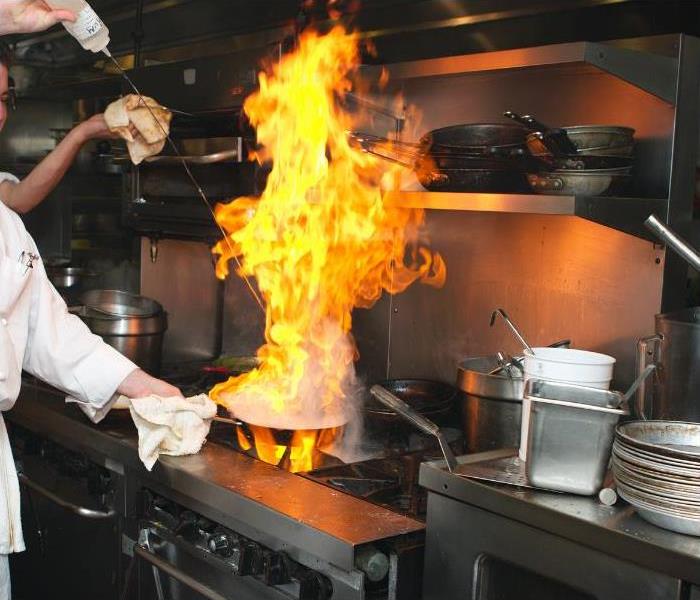 Commercial Kitchen Fire While Cooking
Commercial Kitchen Fire While Cooking
If you own a restaurant, bar or commercial kitchen in Canton, GA or Lathemtown, GA, reducing fire risk is critical to continued profitable operation. The National Fire Protection Association (NFPA) reports that fire departments responded to over 7,410 structure fires in the kitchen of restaurants and bars in 2017 alone. Most of these fires were preventable, resulting in three deaths, 110 injuries, and $165 million in property damage annually in commercial kitchens. These tips will help keep you and your staff safe while preventing shutdowns due to fire code violations.
What Are My Ducting and Air Movement Requirements to Prevent Fire?
While Chapter 7 of the NFPA 96 Standard for Ventilation Control and Fire Protection of Commercial Cooking Operations covers this extensively, here are a few key items to keep in mind.
First, commercial kitchen ducts should never pass-through firewalls, share an exhaust system with the building ventilation, or have obstructed access panels. While doing these things on a commercial kitchen remodel can save costs in the short term, the fire risk increases significantly. If disregarded, your commercial kitchen work will likely not pass inspection.
Make sure to maintain a minimum clearance of 18 inches between combustible materials and the kitchen ducts. This standard is based on Section 4.2 of the NFPA 96, however is one of the easiest to disregard once the kitchen is operational. Ducts can build up high levels of radiant heat that can ignite combustible materials like boxes, cups, plates, utensils, or other kitchen materials.
If you would like additional information on the types of combustible and non-combustible materials that should and shouldn't be kept near the duct, consult Chapter 3 of the NFPA.
What Are My Commercial Kitchen Fire Extinguisher Requirements?
"The NFPA 96 requires automated fire suppression equipment for all grease removal devices, hood exhaust plenums, and exhaust duct systems in a commercial kitchen, as well as any cooking equipment that produces grease-laden vapors." - Koorsen Fire & Security
The NFPA 96 requires use of class K fire extinguishers in conjunction with automatic fire extinguishing systems. These extinguishers also require installed placards stating their extinguisher class. However, in the case of a commercial kitchen fire, it's critical to activate the automatic fire extinguisher system before using portable-type extinguishers. This is because high-efficiency cooking appliances in many modern commercial kitchens are capable of achieving high temperatures that can raise the vegetable oils to intensely high temperatures. When oil ignites at these high temperatures, it can already be so hot that a portable extinguisher is not enough to stop the flames.
Another standard that you should familiarize yourself with is the UL 300 standard.
According to this article by Insureon, a kitchen’s cooking equipment must meet these UL 300 requirements:
- Fire-extinguishing nozzles in the hood, ducts, and above each cooking appliance
- An automatic fuel shut-off capabilities for both gas and electric power sources
- A manual fuel shut-off pull for all power sources
- A wet-chemical fire-extinguishing system that meets UL 300 criteria (one of which is undergoing semiannual checkups by a certified professional)
If you need immediate assistance after a fire, our teams are available 24/7/365. With our promise of being Faster to Any Size Disaster, you can count on SERVPRO of Cherokee County to be there when it counts. Call us today at (770) 924-3848 for rapid assistance.
The Best Cleaning Methods for Water-Damaged Contents
12/16/2021 (Permalink)
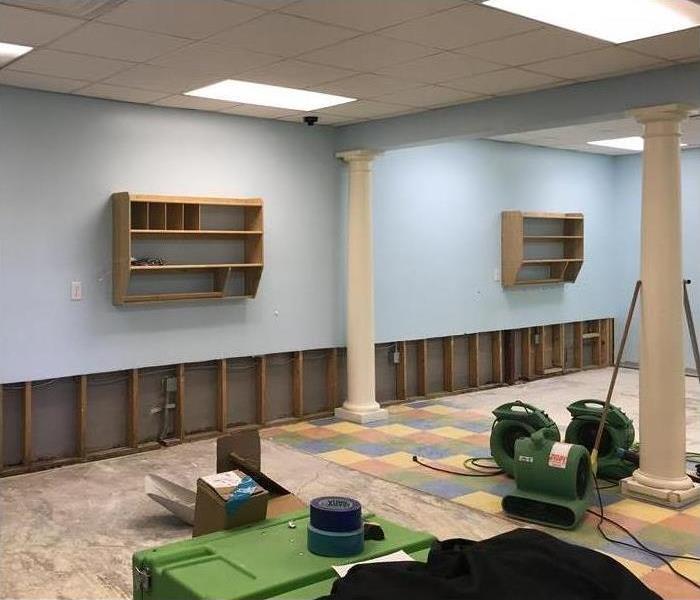 Water damage cleanup in Waleska, GA.
Water damage cleanup in Waleska, GA.
The Best Water-Damaged Content Cleaning Methods
A variety of restoration methods can be effective for contents with water damage. A mitigation service will recommend the best options for cleaning the contents of a flooded company. Find out more about how experts treat different types of items.
Delicate Contents
Delicate contents may require more or less extensive cleaning depending on the category of water damage. Contents exposed to
• Category One clean water should be air dried
• Category Two gray water should be cleaned, disinfected, and dried
• Category Three black water should be cleaned, disinfected, and dried
Some delicate materials may not stand up to disinfection and should be disposed of and replaced. Other items may benefit from dry cleaning, foam, immersion, or spraying and wiping.
Stained Contents
Stained contents may require intensive methods. Depending on the durability and porosity of items, treatments may include
• Foam
• Immersion
• Spraying and wiping
• Ultrasonic waves
• Wet cleaning
These methods can remove stains from many types of contents in a flooded company. Factor in the materials, category of water damage, and cause of staining when selecting a cleaning method.
Non-Porous Contents
Hard, non-porous contents can be good candidates for several cleaning techniques. Damage cleanup experts may recommend abrasion, immersion, treatment with ultrasonic waves, or wet cleaning. The delicacy of items should be taken into consideration when determining the best cleaning method.
Porous Contents
Allow porous items or materials exposed to clean water from a broken pipe to air dry. It may be possible to speed drying by using air movers, dehumidifiers, or fans. Porous contents exposed to contaminated water may need to be thrown away and replaced. These items can pose a recontamination risk.
The owner of a building or flooded company should inquire about content cleaning methods. Most of these treatments call for specialized training and professional equipment or treatment facilities. Rely on a damage restoration firm located in Waleska, GA.
How Many Fire Alarms Do I Need in My Home?
12/6/2021 (Permalink)
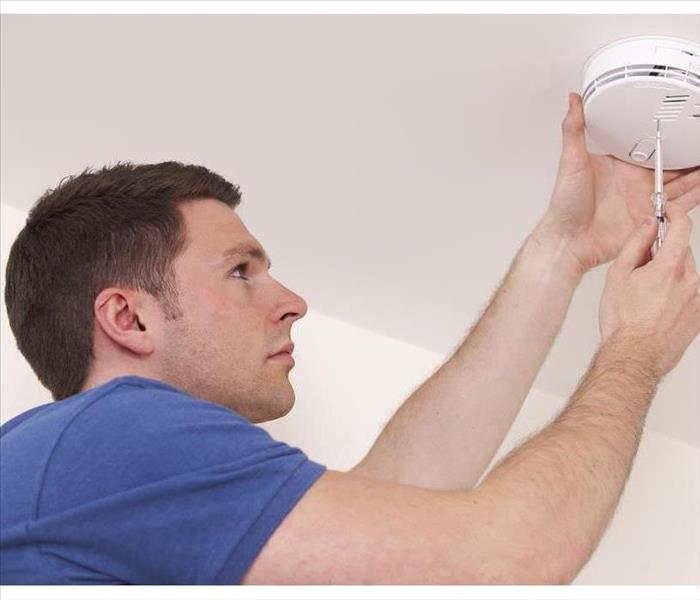 A fire alarm is an essential safety device in your home.
A fire alarm is an essential safety device in your home.
How Many Fire Alarms Should I Install in My Home?
The quantity depends on the size and layout of your home. You can ask your friends and neighbors for an opinion, but the answers will all be different; however, the National Fire Protective Association recommends fire alarm placement:
- In every bedroom
- Outside the sleeping areas on all bedroom levels
- On all levels of the home including the basement
- At the bottom of stairways, including the basement stairs
What Type of Smoke Alarm Do I Need?
Ionization smoke alarms are best at detecting hot, fast-moving fires. Photoelectric smoke alarms are best at detecting slow-burning smoky fires. If both are available, get some of each and take advantage of both technologies. If a fire alarm with both sensors is available in Holly Springs, GA, install those throughout your home.
Should My Smoke Detectors Be Connected?
Connecting smoke detectors is always a good idea. If there is a fire in your home, you want to know about it right away. Early notification of a fire minimizes fire and smoke damage. You don’t want to wait until a closer detector senses the problem and sounds an alarm.
How Long Does a Smoke Alarm Last?
Every smoke alarm has the manufacture date stamped on the back. When ten years from that date has passed, you should replace that unit. If the manufacturer suggests a shorter replacement interval, follow those instructions.
When Should I Replace the Batteries?
It’s always good to replace batteries on a regular schedule. However, if you are the type of person that only responds to the low-battery beep, change them all immediately.
A fire alarm is an essential safety device in your home. It has a long service life, requires little attention and saves lives. It can keep your family safe and minimize fire damage in your home. Take comfort in the fact that, if you do have a fire, there are fire remediation experts in your area. They have been trained to bring your lives and your home back to normal quickly.
How To Fix a Leaky Toilet
11/29/2021 (Permalink)
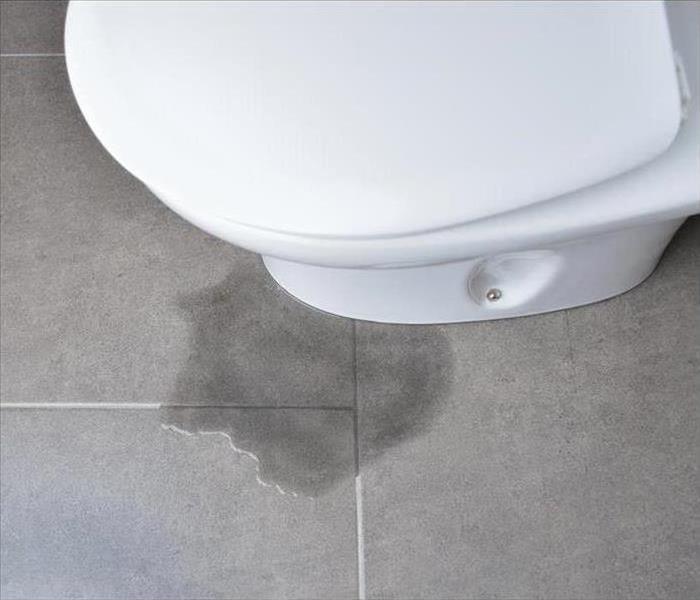 If you notice water leaking around the base of your toilet when you flush, you have a leaking toilet.
If you notice water leaking around the base of your toilet when you flush, you have a leaking toilet.
Steps To Fix A Leaking Toilet
If you notice water leaking around the base of your toilet when you flush, you have a leaking toilet. If ignored, the situation can lead to significant water damage. This type of leak is usually simple to fix by following a few steps.
There are a few causes for seeping water under the toilet base. If you have a large bathroom leak, call a water damage repair person right away.
1. Loose Connection
The easiest leak to fix is a loose connection at the base of the toilet. Shut off the water and flush while holding the handle, making sure the water has completely drained from the tank. After drying the area, remove the old washers and bolts and replace them with new parts. If you still have a leaking toilet, you may have a faulty wax gasket.
2. Faulty Wax Gasket
Once the water is shut off and the toilet and floor are dried, remove the tank lid.
Use a sponge to soak up any remaining water in the tank and wipe it completely. Loosen the nut on the shutoff valve and disconnect the tube from the water supply. Remove the caps from the closet bolts and take off the nuts.
Grab the bowl's rim at the lowest point and rock the toilet gently to break the wax seal. After the toilet has been removed, use a putty knife to scrape off any old wax on the bottom of the toilet and flooring.
Install the new wax ring on the flange and press it into place. Reconnect the closet bolts and align the toilet onto the holes in the base. Press down firmly to create a seal with the new wax ring.
Replace the washers, nuts, and caps and tighten. Finally, reconnect the water supply and turn the water on.
If these suggestions don't fix your leaking toilet in Ball Ground, GA, it is time to contact a plumber before the situation gets out of hand.
3 Simple Chores That Prevent Dryer Fires
11/29/2021 (Permalink)
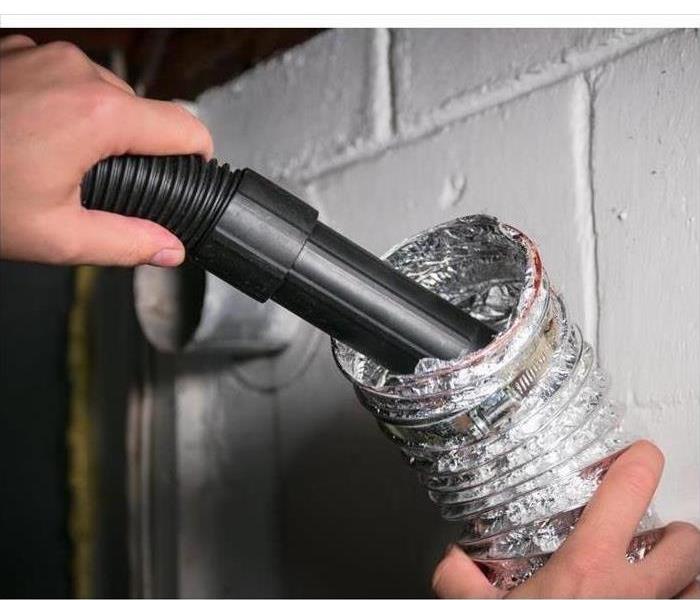 Vacuum inside the dryer exhaust.
Vacuum inside the dryer exhaust.
3 Simple Chores That Prevent Dryer Fires
More than a third of home clothes dryer fires happen because the dryer hasn't been cleaned properly. Sadly, dryer-related fires happen in the thousands, and each year, people are injured or worse, and millions of dollars of property damage occurs. The best way to avoid a dryer or lint fire is to clean and maintain the appliance. In addition to preventing fires, these simple chores have other benefits:
- The dryer dries your clothes more quickly.
- It takes less energy to dry clothes.
- The life expectancy of your dryer is longer.
- You save money on your utility bills.
When you avoid a dryer fire, you also avoid fire damage to your Ball Ground, GA, home.
1. Clean the Dryer Lint Trap
This short task takes seconds and has a big impact on safety and efficiency. Once a month, it's also a good idea to rinse off the trap. Even when you pull the lint out of the trap regularly, there are residues and bits of fluff that aren't removed. A gentle scrub, a quick rinse, and some time to dry will improve how well your appliance runs and helps you avoid a lint fire.
2. Vacuum Inside of the Dryer
At the end of the summer and during the winter, you should clean the dryer more thoroughly. Start by unplugging the dryer and then removing a panel. (There should be a panel that comes off fairly easily for this task. Refer to your owner's manual.) Vacuum out dust and other debris. Carefully avoid coming into contact with moving parts and wiring.
3. Snake Out Dryer Exhaust Hose
Depending on how much laundry you do, the vent and hose should be cleaned out two to four times a year. Start by unplugging the dryer and move it away from the wall. A flexible dryer hose often becomes clogged by lint and other debris. You can vacuum and brush out the vent and the hose. If the tube has any damage, replace it with a new hose.
These quick chores can help you avoid a lint fire and a visit from your local fire damage cleanup and restoration company. The tips can also help you save time and money. You may want to take a peek at your lint trap and dryer hose this weekend.
How To Avoid a Fire During a Natural Gas Leak
11/10/2021 (Permalink)
 It is not easy to a void a gas leak.
It is not easy to a void a gas leak.
Five Tips If You Are Dealing With a Gas Leak
If you smell gas in your Holly Springs, GA, home, it could be a sign that there is a leak. This type of leak could put you at risk for a gas fire. Avoiding a fire may be difficult, but it can be done. Consider these five tips if you ever have to deal with gas leakage, but remember that it may be safer for you to simply evacuate your house and call emergency responders.
1. Avoid creating a spark. When natural gas fills your home, the smallest spark could start an explosion. You can avoid causing sparks by not turning lights on, using candles or making calls on a cellphone.
2. Start airing out the space. If the gas is not allowed to build up in your home, you may lower your risk of a gas explosion. Opening doors and windows increase the ventilation and helps the gas dissipate.
3. Check obvious sources. If you have time, you can check some obvious sources of natural gas leakage. This usually includes appliances that run on gas. Stoves are the most common culprit as it is easy for someone to bump a burner on accident.
4. Turn off the gas. When you hear a hissing sound or smell rotten eggs, you can turn off your home's gas. The valve is usually located by the meter.
5. Know the signs of a leak. Before a gas fire can happen, there usually has to be a leak. You can avoid the fire if you can put a stop to the leak quickly. Common signs of a leak include hissing air, blowing dirt, rotten egg smell and bubbling puddles.
It may not always be possible for you to avoid a gas fire. When the unexpected happens, you need to know who to call for help. A residential fire cleanup crew can help you get your life back to normal.
How to Put a Stop to Mold Growth After Flooding
11/10/2021 (Permalink)
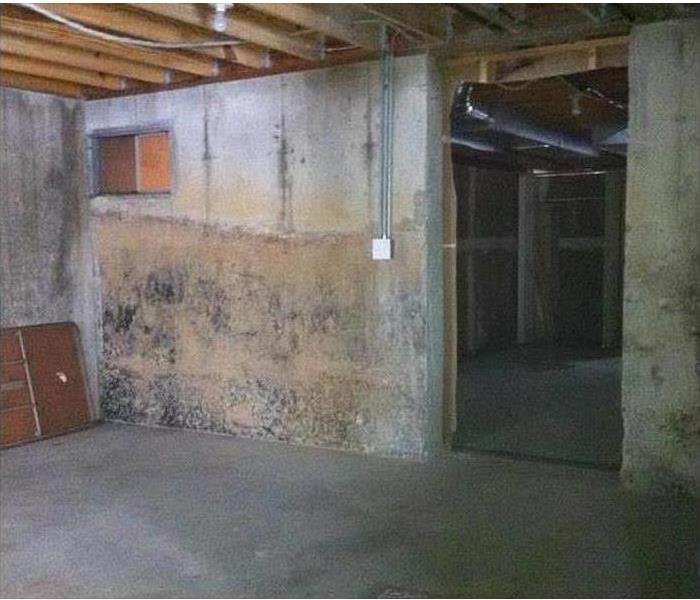 Water can lead to mold growth if not attended quickly.
Water can lead to mold growth if not attended quickly.
Minimizing Damages After Flooding
The most common natural disaster in the United States is flooding. Sadly, the damages experienced after a flood can last for several years after the water has receded. However, with quick action, you can slow down and control mold growth and reduce the effects of standing water. Follow this how-to guide to minimize damages after flooding.
Pinpoint Areas of Risk for Mold Growth
There are several spots throughout your property that could become ideal environments for mold. These may be
- under the carpeting
- in dark corners
- on wall paper
- all over cardboard boxes
- behind ceiling tiles
- on upholstery
The first action you take will be thoroughly drying any potential home for mold, so it's necessary that you identify the places most likely to encourage its growth.
Document the Damage
This step won't do much to control the growth of mold, but it may be very important as you contact mold remediation professionals or file an insurance claim. Take digital pictures with your phone or camera, detailing all of the damage and water-affected property.
Thoroughly Dry Your Property
Use as many methods of drying your spaces as possible. These options include opening doors and windows for ventilation, installing fans to increase air flow, and running dehumidifiers to pull moisture from the air. It's important to begin this process as soon as possible because mold may start growing within just 48 hours after water is present.
Remove and Discard
Many items affected by the standing water may be exposed to harmful bacteria and other dangerous substances. When you've taken appropriate steps to protect yourself, remove ruined items from the building and create a pile on your property. You may need to leave that pile there until an insurance adjuster inspects it. Any food that has been exposed to the flood water should be thrown out immediately.
Remember, it doesn't take long for mold growth to begin. Get started on remediation efforts as soon as you have the go-ahead from the proper Waleska, GA, authorities and be sure to use protective gear and safe work habits to minimize the risk of injuries and illness.
Tips to Upgrade Your Commercial Cleaning Systems
11/9/2021 (Permalink)
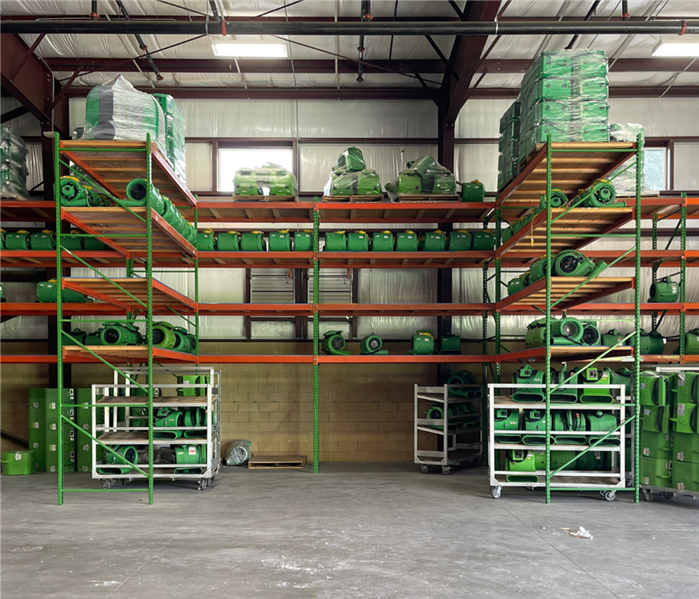 SERVPRO Restoration and Sanitization Equipment ready for dispatch
SERVPRO Restoration and Sanitization Equipment ready for dispatch
Over the past year, Covid-19 restrictions caused many commercial facility building owners and managers to reconsider their cleaning and sanitization programs. With heavy traffic in commercial buildings, germs and pathogens often follow.
Now, many workers and clients expect facility management to maintain high levels of cleanliness in most facilities. This quick guide is meant to provide quick, easy tips to improve your industrial cleaning program. And in case you need expert assistance, SERVPRO of Cherokee County is Here to Help.
Our SERVPRO team is backed by the number 1 name in Property Restoration. We have the expertise and teams to get the job done right every time.
Typical Commercial Cleaning Chemicals
For Hard, Non-Porous Surfaces, cleaning chemicals like Bleach, Alcohol, Pine-Sol, Hydrogen Peroxide, or even Pine-Sol can do the trick. Other options such as Quaternary Ammonia, Phenolics, Iodophores, or Glutaraldehyde containing cleaners, may be just what you need. However, if you have sensitive populations in your commercial property, consider using a Low VOC commercial cleaner. Before implementing any new cleaning program, be sure to read product safety labels and directions for use as some products should never be mixed, can damage certain surfaces, or be harmful at different concentrations.
For Porous Surfaces, specialized cleaning machinery may be needed. However, if you can wash these materials without damaging them, consider utilizing a laundry detergent with a small amount of bleach to clean your porous materials. In other cases, Steam or heat can do the trick in many cases as well.
Sanitizing Machinery
When it comes to commercial sanitizing services, many cleaning chemicals need mechanical assistance as well. For difficult-to-reach locations, or large open spaces, machine support may be needed.
Hydroxyls: These machines produce what are called Hydroxyl Radicals which dismantle the molecular structure of odors, volatile organic compounds, and many airborne pathogens. They emit no odor whatsoever and can be very effective to sanitize large open spaces.
Ozone Machines: These machines work by applying a specialized electric current to air that then creates ozone. This ozone oxidizes and destroys airborne pathogens and sanitizes spaces and porous surfaces very effectively. However, it can also pose a health risk when inhaled in large quantities and emits a distinctive odor.
Due to the potential cost and risks with some of these machines, it may be best to call in professionals for your commercial sanitization needs.
If you believe your business would benefit from Commercial Sanitizing Services, our teams at SERVPRO of Cherokee County ready and available 24/7 to help you be Certified SERVPRO Cleaned.
Call us today at (770) 924-3848
For more on our Commercial Cleaning capabilities, read our blog We Are Cleaning Experts here.
Why Do Swamp Coolers Often Lead to Mold?
10/27/2021 (Permalink)
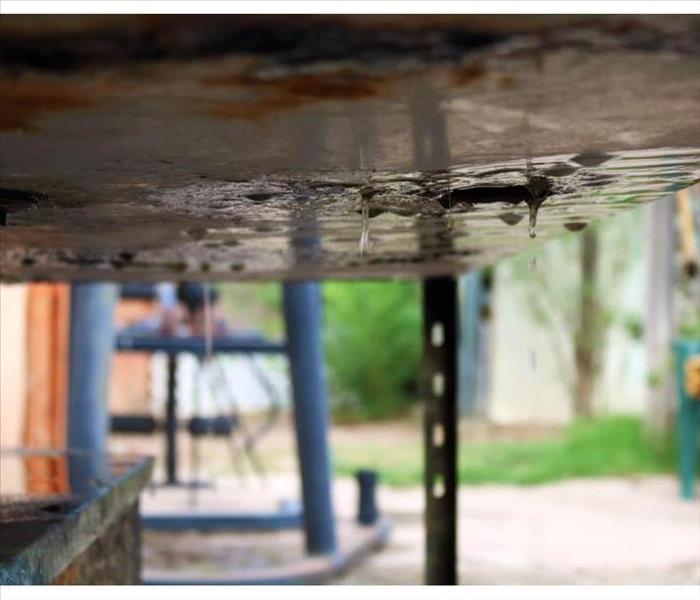 Many swamp coolers lead to mold growth.
Many swamp coolers lead to mold growth.
Why Do Swamp Coolers Frequently Cause Mold?
Do you have a swamp cooler in your Ball Ground, GA, home? This cooling device evaporates cool moisture rather than uses forced air to cool down a home. Many homeowners choose to use this type of cooling unit because it is more energy-efficient than an air conditioning device, but it has other faults. Many swamp coolers lead to mold growth.
• Excess Moisture: The development of mold is not that surprising. After all, the system actually uses evaporated water to cool down your home. Usually, the cooler is connected to your home's water supply to ensure it always has the water needed to run properly. If the water supply leaks or the belt builds up condensation, you may have too much moisture around the unit. You may get too much water simply because you have a leaking swamp cooler.
• Too Many Components: While this unit is more efficient than an AC, it still has a lot of components to make it work. There's the central unit, belt fan, cellulose pad, and ducts. Water can get trapped at any of these locations leaving you with a moldy house. A regular cleaning of these components done by a professional mold cleanup crew can help you stop mold from growing.
• Broken Parts: Like other household appliances, this machine can have breakdowns. A leaking swamp cooler only exacerbates the moisture buildup these machines are known for. If the belt breaks down or another issue arises, the water may sit there inviting spores, bacteria and other unwanted growth.
• Added Humidity: Not only does the cooler itself introduce extra moisture to your house, but the weather could increase the humidity levels. If there is a humid day, you may be at an even higher than normal risk of mold growth occurring.
Even when you aren't dealing with a leaking swamp cooler, there is a chance that your cooling device could be introducing mold to your home. If mold growth is a regular problem, you may want to consider switching to an AC unit.
Choosing a Fire Mitigation Company for Rebuild
10/27/2021 (Permalink)
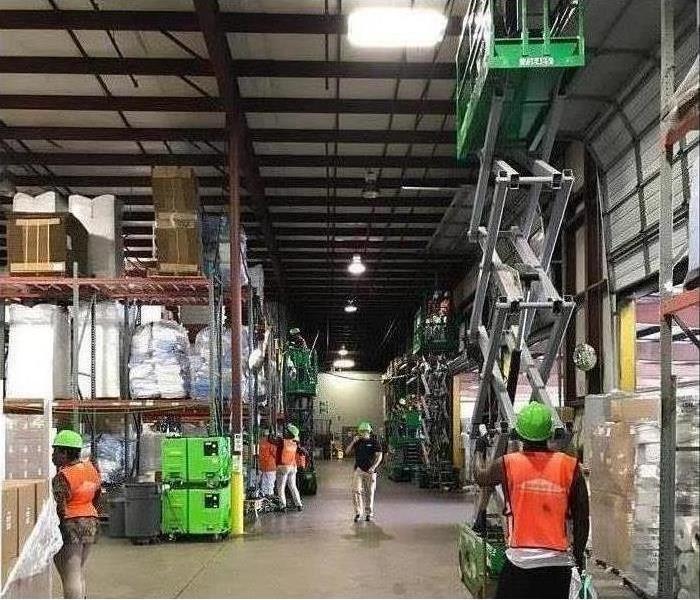 Fire damage cleanup in Holly Springs, GA.
Fire damage cleanup in Holly Springs, GA.
Selecting a Fire Mitigation Company for Reconstruction
When you’re facing fire damage from a conflagration on your property, you aren’t just dealing with fire mitigation. You also have to deal with smoke damage, water damage, and reconstruction, not to mention replacement of any damaged or otherwise unsalvageable equipment. When you find yourself in this situation, you need to choose a fire remediation and mitigation company that can provide all your Holly Springs, GA, services in one place.
Why One Company?
If you choose one company over several, you can consolidate your reconstruction and mitigation efforts in a single easy one-stop shop. Using one company can ensure:
• You only have to deal with one contractor for fire damage, smoke damage, and water damage
• An insurance adjuster only has to handle communication with one company
• You can shorten your restoration timeline with a single company that doesn’t have to coordinate with others
• You can reduce conflicts between different contractors
Attempting to marry all these services across multiple different contractors can cost you more money, as well. Some contractors have minimum base fees for jobs, as well as additional charges that can quickly rack up your bill when multiplied by multiple contractors. Choosing one company can significantly reduce the number of charges you face, and can make billing and payments much easier.
Finding the Right Company
Finding the right company after your business has dealt with fire damage can be difficult. Make sure to research companies in your area to find out what services they offer, and how other customers have rated them. Also, check their certifications for remediation and recovery. A few other critical services you may want to check for are smoke odor cleanup, electronics restoration, and mold damage remediation – yes, mold. If you’ve suffered water damage from burst pipes or firefighters’ efforts, you may have standing water or saturated items that can quickly begin to grow mold.
4 Plumbing Problems That Demand Immediate Attention
10/13/2021 (Permalink)
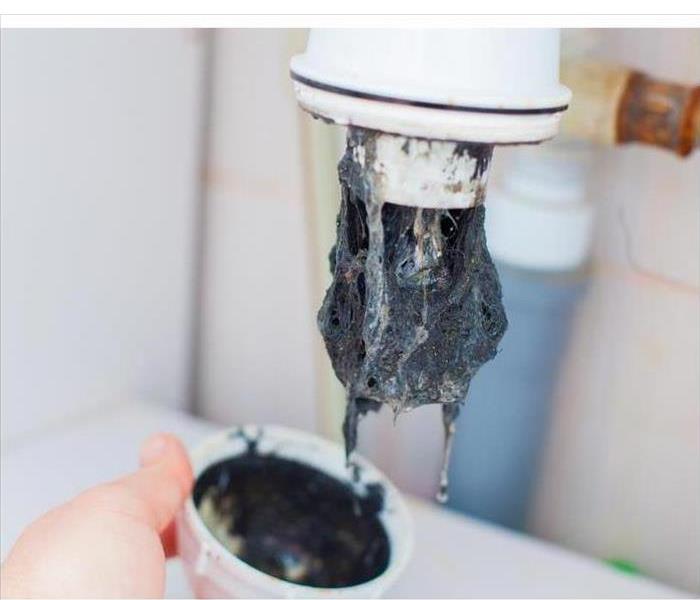 Clogged pipe in a Canton, OH home
Clogged pipe in a Canton, OH home
4 Plumbing Problems That Demand Immediate Attention
Though plumbing problems are almost always unpleasant to address, raw sewage into a home is among a homeowner's biggest nightmares. It does happen from time to time. If it does, it is smart to call in local water remediation specialists in Canton, GA. They are set up to deal with problems exactly like this, and they have the right equipment for quick and safe sewage cleaning. They are Faster to Any Size Disaster and can be of service in many tricky situations.
1. Toilet Overflow. Sometimes, a drain pipe becomes clogged between the toilet and the sewer, and when a person is taking a shower the toilet fills up with water and spills onto the flooring. This could release dirty water into the room. Sometimes the problem can be handled with drain snake or a plunger, but sometimes a plumbing contractor will be needed.
2. Clogged Pipe. A sewage line that becomes obstructed can result in contaminated water discharging back into the home. When this happens, professional sewage cleaning will be required. A category 3 water spill is the most serious level and should be professionally handled to protect human health and to prevent additional property damage.
3. Ruptured Pipe. Plumbing pipes break for any number of reasons, especially if they are old or made of outdated materials. They can also break due to freezing or to maintenance work. Whether the water is clean or dirty, it will need to removed from the home and the area dried out to limit structural damage to the home.
4. Water Heater Malfunction. At the end of its lifespan, a water heater sometimes fails, spilling 40 or more gallons of water into the home. The heater will need to be replaced and the water damage mitigated.
Professional sewage cleaning removes the dirty water from the home and disinfects all of the impacted surfaces. A quick response doesn't give the spilled water time to do additional damage to the home.
Don't Wait To Mitigate
9/19/2021 (Permalink)
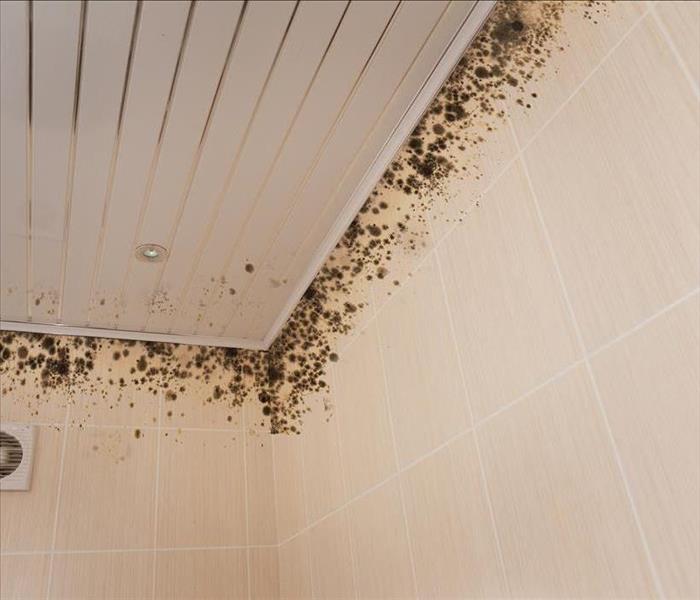 Mold prevention is more likely if you call technicians at the first sign of trouble.
Mold prevention is more likely if you call technicians at the first sign of trouble.
A home can flood for many reasons. Perhaps a weak spot in a pipe causes it to leak or burst. Maybe a toilet gets clogged and overflows. Excess rain can seep through cracks in the foundation and cause water damage in the basement. In every one of these instances, swift water mitigation is necessary for mold prevention. Mold occurs when stale air and organic matter and dampness combine to form the perfect environment for its growth. Robbing it of one of these elements significantly reduces the risk of it growing.
Busted Pipes
The tricky thing about having a busted pipe in your home in Woodstock, GA, is that the problem is likely hidden from plain view. If a pipe bursts behind a wall, it can cause a lot of damage before you ever know there's an issue:
• Soggy insulation
• Compromised drywall
• Ruined ceiling tiles (if the busted pipe is upstairs)
• Flooded light fixtures
Look for the signs of leaks that occur behind walls and between the different levels of the house. Mold prevention may still be possible if you call in the experts as soon as you see dark spots on the ceiling or feel weak or mushy spots in the walls.
Overflowed Toilet
If your toilet gets clogged, a single flush can bury your bathroom floor in an inch or two of water. This water wastes no time seeping into the floor. If you simply wipe up the water you can see with a towel, you may be missing all the water that is beneath the surface. Mold growth in the grout on your bathroom floors means the grout will have to be replaced.
Excess Rain
There's nothing you can do to prevent a lot of rain from falling, and there may not be much you can do to keep it out of your basement. If your basement does flood, call mitigation experts at once to keep mold at bay.
Mold prevention is more likely if you call technicians at the first sign of trouble. Don’t make a problem worse by dragging your feet.
4 Ways to Prepare for Disaster
9/14/2021 (Permalink)
Ways To Be Prepared For The Worst
Businesses in Free Home, GA, know that the weather can be fickle. Instead of hoping for the best when the forecast is extreme, develop a disaster preparedness plan to be prepared. While torrential winds and rains may be unavoidable, other factors can result in a business interruption or the need for extensive water damage and restoration services. To help minimize risk and ensure safety is a priority, below are four tips to help be prepared for the worst.
1. Assess Potential Risk
Weather events may be the most common culprit for interruptions, but Mother Nature isn’t the only unknown. Since every business is unique, it is important to assess those unique potential risks. Old plumbing may lead to a pipe burst, power outages can happen out of the blue, and human error can result in a fire.
2. Backup Data
Business preparedness for nearly any company means ensuring vital documents, whether physical or on computers, is accessible after a storm or other event. Instead of waiting for a disaster to destroy them, keep them safe by creating physical backups that are safely stored offsite. With technology making data storage easier, digitally backup and encrypting data is easier and safer than ever.
3. Prepare a Plan
Disaster preparedness requires asking the what-ifs. How would each minute, hour, day or week unfold? Who will ensure everyone safely exits the premises? How will communications with clients and customers happen? These and other questions should be compiled into an emergency plan.
4. Maintain Communication
Maintaining communication is essential for safety and serves as a way to update everyone on any closure, changes of hours, or temporary relocations that are required. operations plan should emphasize more than what to do before a natural disaster impacts your company. It also should detail how communication will be maintained during the disaster and its aftermath.
While these are only a few disaster preparedness tips, sitting down and formulating a plan will help a business better weather a storm and find other ways to minimize potential losses.
Do Air Purifiers Remove Mold? Mold infamously reproduces by traveling through the air and finding a damp area to grow and spread.
9/7/2021 (Permalink)
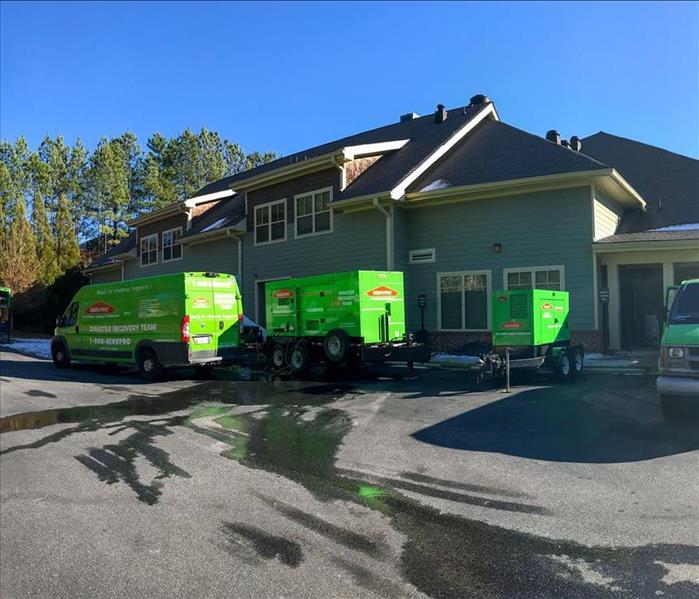 Air filtration can help prevent mold if you use a purifier that uses HEPA filters.
Air filtration can help prevent mold if you use a purifier that uses HEPA filters.
Do Air Purifiers Remove Mold?
Mold infamously reproduces by traveling through the air and finding a damp area to grow and spread. It makes sense that air purifiers can prevent mold from spreading in your home, but do they really work? This informative article can give you a better idea concerning mold removal and whether air filtration can work for you.
What Air Purifiers Do
A purifier removes contaminants from the air, such as dust and pollen. This can be helpful for people with allergies or asthma. Luckily there are specific purifiers that can remove mold from the air. These machines have HEPA filters.
HEPA stands for High-Efficiency Particulate Air and is designed to trap airborne particles that are 0.3 microns or larger. This type of air filtration is recommended by most health agencies such as the EPA and the American Lung Association.
Why They Are Useful
Most mold spores span 1-30 microns, which means that the HEPA filter can remove the spores from the air. By using a purifier, you can prevent spores from spreading or contaminating other parts of your home in Cherokee County. It can also protect you and your family members from inhaling any spores.
When Professional Help May Be Needed
You can prevent mold from spreading, but what happens when mold has already spread throughout your home? This might require the help of mold removal specialists. Here are some reasons you should consider doing more than just purchasing an air purifier:
• The mold may already be spreading
• Spores may be embedded in furniture and other porous objects
• Leaks or condensation may be a big issue in your home
If these problems are familiar to your house, then you should seek expert advice and help. Complete removal of all mold is important.
Air filtration can help prevent mold if you use a purifier that uses HEPA filters. Doing this can stop the spreading of airborne mold spores, but you might need professional help to remove past or current mold growth.
Air Freshener Alone Isn’t Going to Cover That up: Flood Odor and the Removal Process
9/2/2021 (Permalink)
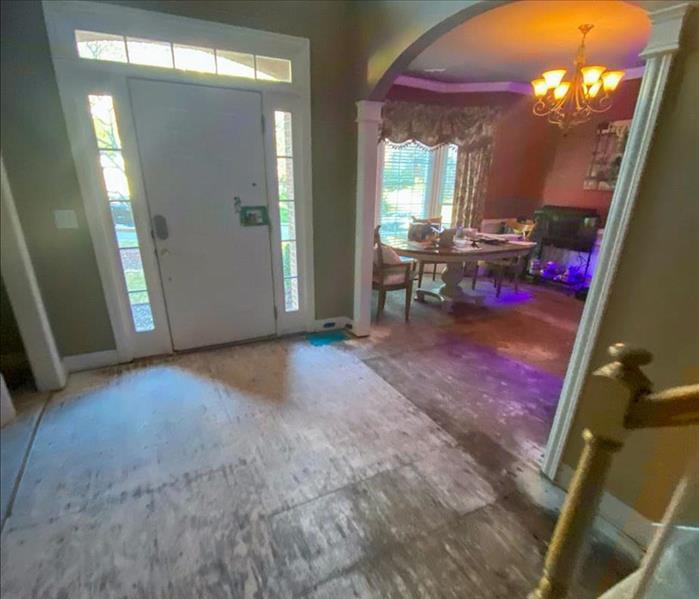 The odor that occurs after flooding is a combination of sewage and mold growth.
The odor that occurs after flooding is a combination of sewage and mold growth.
Flood water is typically a mixture of overflowing rivers and sewage loss. It is no surprise, then, that floods leave behind a significant odor when they recede, especially when you consider the addition of mold growth. For most homeowners, the elimination of the smell is the most substantial part of the removal process; however, it can be overwhelming to figure out just what to do. The following four steps should help ease your mind.
1. Wet Vac and Dry Flooded Areas
The first step to removing the odor in your home is the same as the first step for restoration: remove any excess water and dry flooded areas thoroughly. To speed up this process, you’ll want to have on hand several wet-vacs, industrial fans, and air movers. In addition to these tools, you should open up all doors and windows to help ventilate your home.
2. Remove Affected Materials
Beyond removing excess water and drying out damaged areas, you’ll want to remove all affected materials, including carpeting, draperies, drywall, and insulation. Any of these items that are left and may contain moisture can lead to further mold growth, which will contribute to both the odor and other health effects.
3. Steam Clean and Disinfect Everything
Once your home is thoroughly dry and affected materials have been removed, it is time to clean and disinfect everything. You will want to rent steam cleaners and purchase several mops and rags. You can begin by mopping all the floors and wiping down all walls with your choice of disinfectant. You can follow this by steam cleaning any remaining carpeting, draperies, or furniture. After you have done all the scrubbing, you should also disinfect any plumbing fixtures and ductwork.
4. Call an Expert
Cherokee County likely has several restoration specialists near you. There is no reason to have to go it alone. Experts offer a vast array of services, and their experience can be invaluable to you.
The odor that occurs after flooding is a combination of sewage and mold growth. While it may seem unbearable and resilient, the steps above should help you remove the odor and restore your home to some degree.
3 Tips To Avoid the Spread of Mold
7/24/2021 (Permalink)
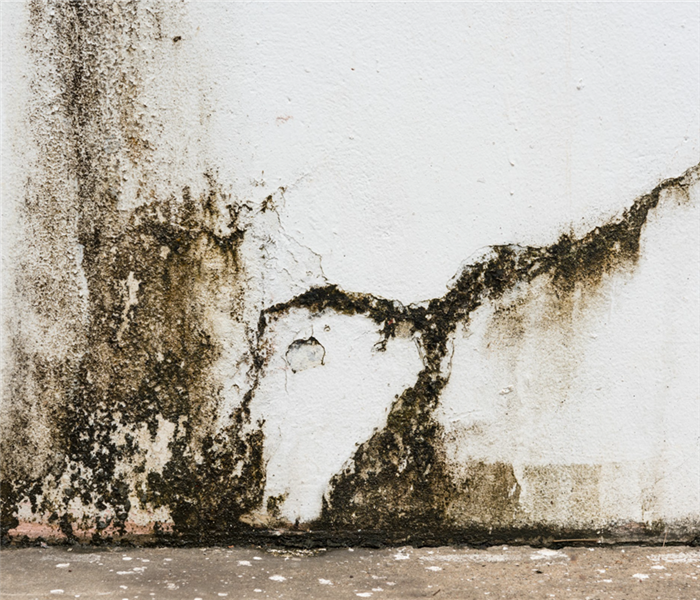 Black mold damage found in Woodstock, GA.
Black mold damage found in Woodstock, GA.
3 Ways to Prevent Mold From Spreading
If you have found black mold damage in your commercial building in Woodstock, GA, you are probably eager to do whatever you can to eradicate it and avoid further harm to the structure. Here are three important tips to remember that, along with help from mold cleanup professionals, will allow you to avoid further destruction down the road.
1. Turn Off Your Water
You likely already know that moisture is a common cause of mold growth. The first step to containing mold is to turn off your water immediately. If you notice any fresh wetness, clean it up with help from a mold remediation company and try to identify the cause as soon as possible. This is important to help prevent the threat of a larger moisture problem. In addition to helping with cleanup, a professional can assist you in figuring out what may be triggering mold growth.
2. Remove Airflow Sources
Airflow can cause the spread of black mold spores. It’s a good idea to promptly turn off the company HVAC system, especially if you believe that mold growth has occurred within it. A remediation company can help you figure out exactly where this growth exists. You will also likely need to have more regular HVAC maintenance checks going forward to make sure that mold on or in your equipment is not a recurring concern.
3. Eliminate Existing Mold
The final tip you need to remember is to get rid of any existing mold in your facility so you do not end up with a larger issue at hand. There are more steps within this process, but quickly disposing of smaller objects that have been affected by mold and enlisting professional help with your overall mold cleanup and restoration in Woodstock, GA, are two good ways to start if you want to make sure that you have the basics covered.
Black mold can spread quickly and cause you to lose valuable commercial assets. Following these tips and getting help from experienced mold remediation specialists will help you protect your property and your peace of mind.
How Smart Is Buying a Smart Smoke Detector?
7/23/2021 (Permalink)
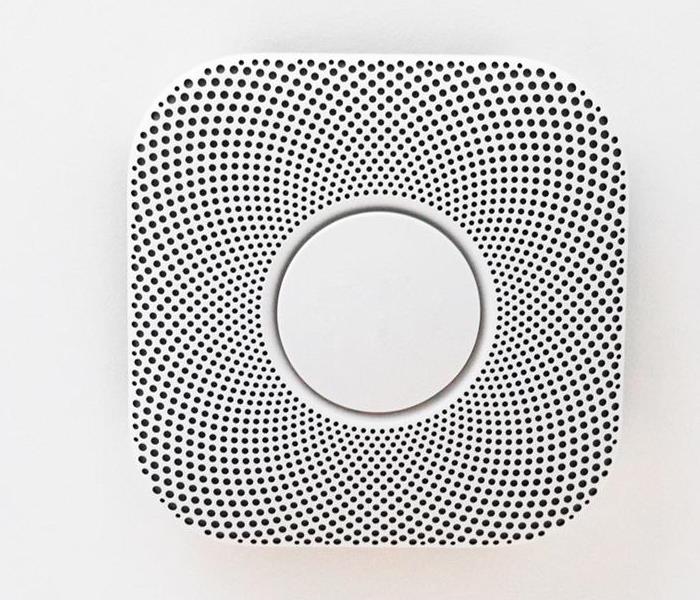 Fire safety is greatly improved with the smart smoke alarm technology offered nowadays.
Fire safety is greatly improved with the smart smoke alarm technology offered nowadays.
Buying A Smart Smoke Detector: How Smart Is It?
If you’re looking to modernize your Free Home,GA home, you’ve probably heard of a smart smoke alarm. Compared to a traditional smoke detector, a connected one offers benefits allowed by modern technology. Understanding what makes them “smart” will allow you to make an informed decision if it’s worth buying one yourself.
Features of a Smart Alarm
There is no single model of smart smoke detector. It is worth shopping around to find a model that has all you want. They offer an assortment of convenience and advanced monitoring depending on the year and model:
- Pinging connected devices if smoke or carbon monoxide is detected
- Advanced technologies for faster smoke detection and self-testing
- No alarm beeping when the battery is low in favor of an app notification
- Voice-activated personal assistant integration around your home with Amazon Alexa, Google Assistant or Apple HomeKit for convenience and functionality when there is no danger
Stop a Fire Yourself Even When Not Home
The top benefit of a smart smoke alarm is the ability to act yourself even while away from home. A neighbor may call emergency services for you, but the problem has already flared out of control when it becomes noticeable to other households.
With the modern sensors and an immediate application alert, you will know exactly where the fire is so you can make the call to deploy fire services if the fire is major. You can also deploy nearby neighbors or relatives to extinguish minor fires before they become unmanageable no matter how far away you are.
Fight Fire Using Your Fingertips
By connecting a smart alarm, your phone can become a command center for your entire home. Unfortunately, a fire still damages your home even if caught earlier. Using its most basic feature, your phone can call a local fire restoration company to clean up and repair any damage.
Digitally monitoring your home is a benefit of the digital age. Fire safety is greatly improved with the smart smoke alarm technology offered nowadays.
4 Commercial Storm Preparation Tips
6/25/2021 (Permalink)
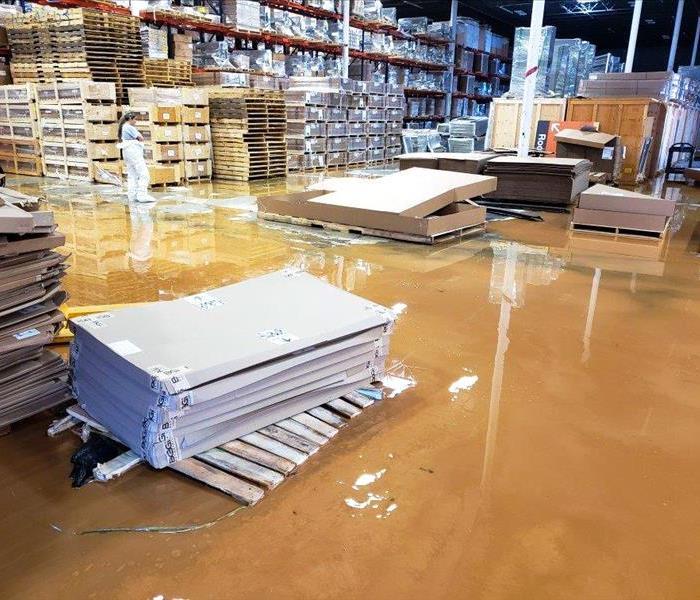 Businesses should have backup plans in place.
Businesses should have backup plans in place.
Storm Preparation Tips
Many businesses are unprepared for storm damage, which can range from the slight presence of floodwater all the way up to a completely flooded building. The four steps below can help owners and occupants of commercial properties limit the extent of damage and get back to work as soon as possible.
1. Check your insurance coverage.
Make sure that your business or commercial property is protected against the most common types of storm damage in your region, including floodwater. This may involve taking additional riders or endorsements on top of a standard business insurance policy.
2. Check stores of emergency supplies.
A commercial property should have a store of sandbags and polyethylene sheeting, hand tools, and possibly a generator and fuel supplies in the event of a storm.
3. Have a data protection plan in place.
Insurers can replace equipment that sustains storm damage, but it is much more difficult to restore corrupted or lost data. Businesses should have data backup plans in place well before a storm and follow protocols to prevent information loss.
4. Come up with plans for evacuation and property safety.
You should have a plan to limit the damage as a storm is approaching. Lift and disconnect appliances, fixtures, and wiring. Shut off the flow of electricity to non-necessary appliances. You should also have a detailed evacuation plan for all occupants and visitors in the building posted in visible areas throughout the structure.
A little planning ahead of time can help you prepare a business in Free Home, GA for a storm. If the property sustains damage, reach out to a commercial water damage or storm damage restoration service as soon as possible. These experts specialize in the removal of floodwater and cleaning, drying, and deodorizing flooded buildings. A quick response can limit the extent of secondary damage resulting from water damage, including mold growth.
5 Steps to Saving Carpets in Flooded Rooms
6/24/2021 (Permalink)
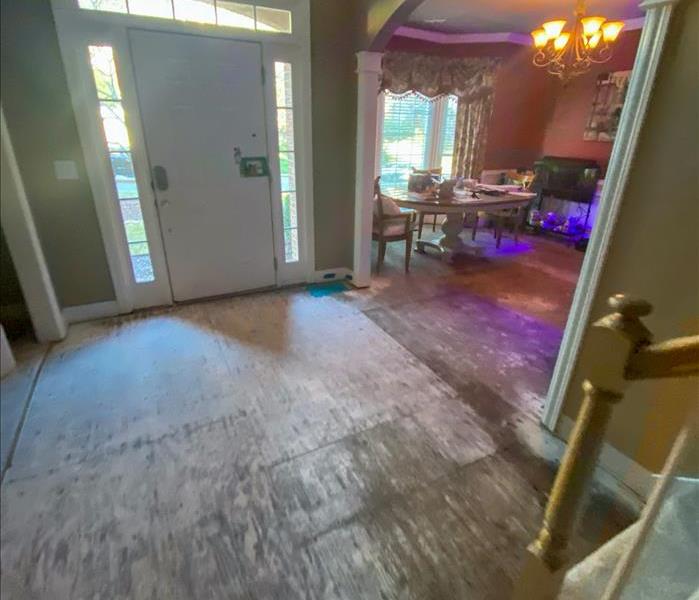 Woodstock, GA water damage.
Woodstock, GA water damage.
What To Do When You Flood Your Carpet?
Flooding due to a heavy storm or a pipe break can lead to water damage throughout your home in Woodstock, GA. A quick response from restoration experts can help you reduce the extent of the damage. One area where costs can be high is the replacement of flooring in affected areas. If you hope to keep your carpet after it has been covered by floodwater, you'll need to take the following steps:
1. Act Immediately
The severity of damage increases quickly as water is allowed to sit and remain in contact with the flooring and other building components. The longer those contents are wet, the more likely it is that mold will grow. The most effective response is to remove all water and dry the area within 48 hours.
2. Ventilate Thoroughly
Moisture on materials, such as the paper-backing of carpeting, provides an ideal environment for mold to take hold. Slow the rate of damage to hidden areas by opening the windows and installing fans. This ventilation allows you to keep air moving to dry the area more quickly and will help maintain ideal drying temperatures. One exception to this is when remediation experts install heated fans. If the technicians close the windows, don't open them until you have the go-ahead.
3. Complete Clean and Disinfect
Discuss the availability of specialized cleaning products for rugs and other floorings with a restoration expert. As you clean, protect uncontaminated areas to avoid spreading water or mold damage.
4. Assess the Damages
Do you need to replace the carpet? If the water was from a clean source, such as a pipe break or a water supply line, you'll be able to save your flooring, clothing, and other items. The best way to determine what to save is to weigh the actual replacement cost and the sentimental value of the item. However, if the floodwater contained any contaminants, you should work with a professional to determine what is safe to keep.
5. Confirm Proper Drying
Don't begin reconstruction until all wet materials have been appropriately dried. Get confirmation from your water restoration professional before covering affected wood or returning furnishings rooms with a carpet.
What To Avoid When Putting Out a Grease Fire and How To Contain It
6/24/2021 (Permalink)
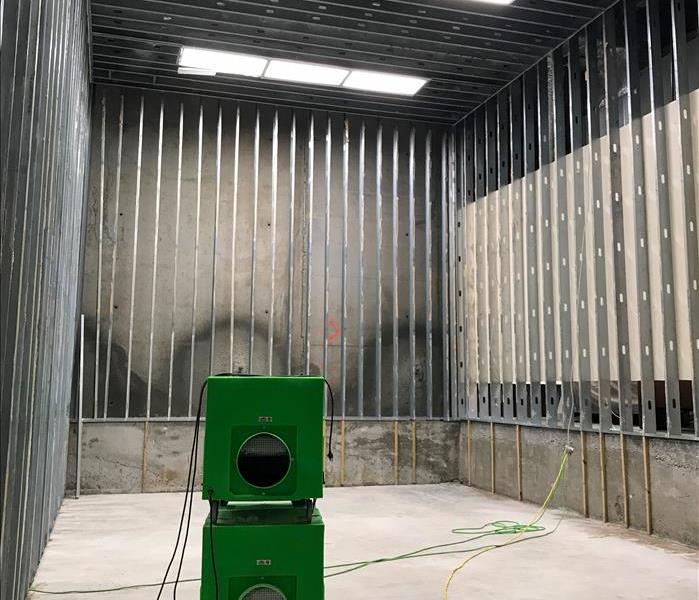 Let us help with the fire damage restoration.
Let us help with the fire damage restoration.
How To Put Grease Fire Out
Grease fires are dangerous and can quickly grow out of control. When cooking oil gets too hot, it starts to smoke and can easily catch fire. In the event a grease fire happens, knowing what to do and what to avoid can not only minimize the cost of fire cleanup in Free Home, GA but it can also save lives.
Use a Lid or Pan to Smother the Flame
Fires are fed by oxygen. To extinguish a grease fire:
- Quickly cover the fire with a lid or pan so that you can cut off the fuel source and smother the flame.
- Be sure to turn off the heat immediately.
- Don’t remove the lid until the pan is completely cool. If you take off the lid too soon, the fresh air can reignite the hot flames.
If this doesn’t work, consider using baking soda or salt to quench the flames.
Never Pour Water on a Grease Fire
One of the worst things you can do to a grease fire is to add water. Oil and water don’t mix, so the water evaporates on the hot stove, creating a sudden burst of hot steam that spreads the fire. The more water used, the bigger the blast of fire. This can cause the fire to swell out of control.
Don’t Move the Flame
If you are worried about the flame, you might decide to move the fire outside. However, there are many dangers when moving a grease fire. The risk of dropping the hot pan could spread the fire into other parts of your home. Also, movement creates more oxygen, which can feed the flame and cause it to become bigger. It’s best to contain the flames on the stove.
Grease fires can be handled right if you make smart decisions in the few seconds you have when the fire erupts. If the fire gets out of hand, evacuate immediately and call 911 for help.
Fortifying Your Roof From Major Storm Damage: Steps Commercial Owners Can Do
6/14/2021 (Permalink)
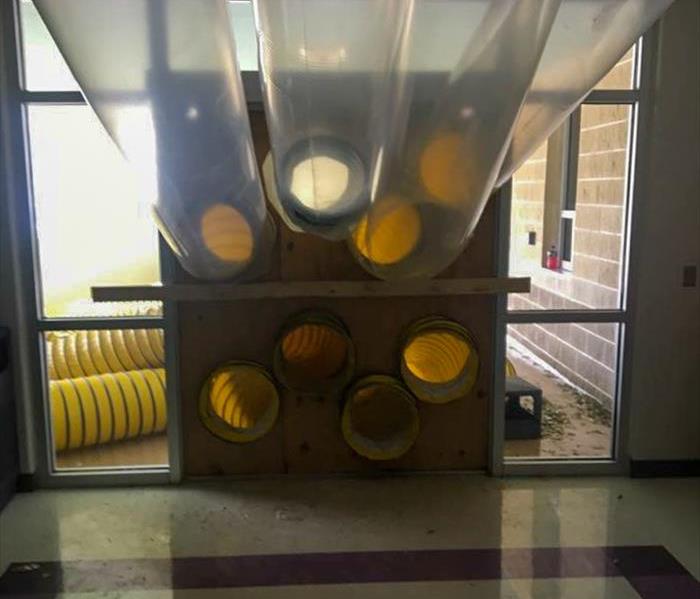 We can handle any commercial restoration job
We can handle any commercial restoration job
Preventative Measures To Avoid Roof Damage In Your Business
When a hurricane enters a city, no matter what the category, it's fierce and destructive. In fact, in 2019, the Congressional Budget Office estimated a total of 9 billion in commercial property destruction alone. The cost escalates because buildings incur massive impacts such as roof damage. Such issues demand expensive repairs. Proprietors in Lebanon, GA do have methods to mitigate this concern. Owners should take the following actions to reduce costs and remediation.
1. Be Aware of Waterflow
Where is the excess water from the storm going? Property is designed to have appropriate drainage; however, blockages occur that prevent the flow. After showers, walk the grounds, checking to ensure that puddles aren't forming near the facility or along the roof and foundation.
Tackle gutters: These become clogged with leaves and debris. The fluid should move freely to keep it from building on the roof. Too much weighs down the rooftop, permitting possible breaches. This event would require an expensive roof rebuild.
Eliminate large puddles: Work with landscapers and groundskeepers to avoid bushes from stopping the movement.
Check the land's slope: Water should make it to retention ponds. If not, redo the slant.
2. Repair Minor Issues Regularly
Twice a year, have a specialist survey for roof damage. Tend to any broken shingles, cracks, or holes immediately. These openings expose the barrier to possible water penetration. If large portions are left alone, it could harm the integrity. It's also beneficial to have a water restoration company evaluate for potential mold.
3. Be Cognizant of Possible Wind Hazards
Moisture isn't the only concern with hurricanes, wind damage is highly likely as well. Speeds are extreme, turning something seemingly harmless into a missile. Minimize this danger by bringing loose objects inside and keeping foliage trimmed and well-tended.
Commercial owners have little control during a hurricane, but before a storm rolls through, they do. Be aware of how roof damage occurs and take preventative measures to prevent it. That is an essential and powerful tool to reducing costs and headaches.
Black Mold Remediation Generally Requires Certification
6/14/2021 (Permalink)
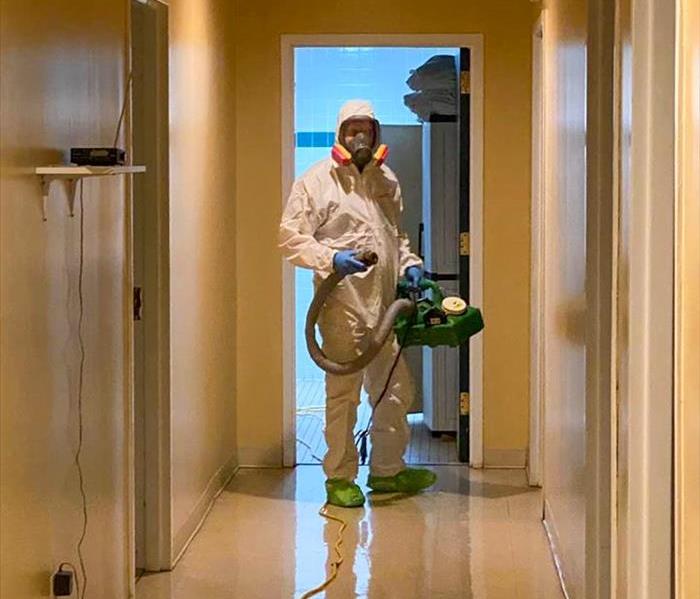 Commercial mold restoration in Free Home, GA.
Commercial mold restoration in Free Home, GA.
Mold Remediation
If you suspect you have black mold growing in your home, you need to contact a certified mold expert for an inspection. Free Home, GA is seeing an increase in black mold colonies growing inside homes, so you should be aware of the signs of black mold:
- Black, yellow or green areas growing on porous material.
- A persistent musty smell in an area.
- Warping or cracking drywall.
Mold Certification Is Essential
Mold is a tricky substance. The air you breathe has hundreds of mold spores in it. Don't worry! That's a perfectly safe level and is harmless to most humans.
The problem is that it takes a certified mold expert to distinguish between dangerous and harmless mold. It's amazingly easy for do-it-yourselfers and uncertified testers to improperly place equipment, leave it running too long or cause other problems with the test. Without rigorous training, you may be left with a test that's wrong and leaving you with a house filled with mold or an unnecessary mold restoration.
Fighting Mold Can Be Tricky
Eliminating mold in a home not only means removing the mold, but also requires removing the source. While a water leak from a pipe might be obvious, all it takes is a continuously elevated humidity level to cause explosive mold growth in an enclosed area. Since the mold spores are already in the air, they're just looking for nutrients (which exist in some construction materials) and excess moisture. Certified mold remediation requires an understanding of every component of home building and repair.
Standards and Practices
The organization that offers certification is the Institute of Inspection, Cleaning and Restoration Certification. They work directly with the American National Standards Institute to set industry-wide standards for inspection, testing and removal of mold, with an emphasis on real-life mold remediation. ANSI and IICRC are nationally recognized as the organizations that set national standards in every area of life.
If your certified mold specialist informs you that your home passed its mold test, you can feel confident that black mold isn't a problem. If it fails the test, you need to address your mold problem before it gets worse.
How Professionals Can Restore Your Property After a Fire
4/19/2021 (Permalink)
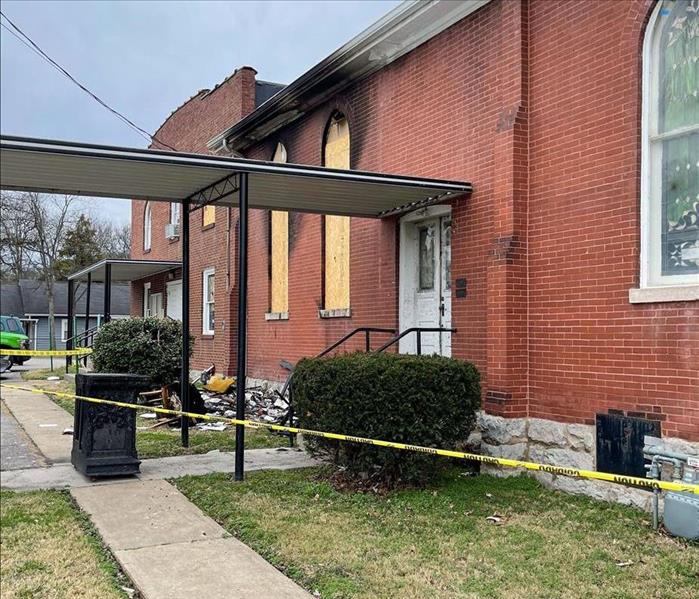 Fire damage in Free Home, GA.
Fire damage in Free Home, GA.
Fires can be incredibly devastating to a commercial or residential property, and unfortunately, an extinguished fire does not signify the finality of its destruction. Along with fire damage comes a host of concerns like flooding generated from the firefighters' relief efforts. Read on to learn how you can pick up the pieces following a fire either at work or home.
What to Do First
If your property experiences flooding or water damage post-fire, there are several steps you can take initially to help make the restoration process simple and straightforward:
- Remove excess water to the best of your ability.
- Elevate furniture from wet rugs and carpets.
- Remove and prop waterlogged cushions and pillows.
- Protect fine art by relocating it to a safe and dry space.
What to Expect Next
Upon their arrival, the professionals will conduct a fire damage assessment. In addition to heat damage, they will evaluate any flooding and water damage caused by a fire hose or other relief efforts. They can carefully inspect smoke odor and soot contamination and give you an idea of how long your restoration process might take.
How They Will Help
After developing a plan of action, professionals in Free Home, GA will board and secure your property to avoid any additional potential for further damage. In terms of flooding and water damage, specialists will use commercial-grade materials to soak up the excess water and fans and dehumidifiers to ensure the property's interior is completely dry.
Further, professional removal of smoke and soot will restore your home or office to its pre-fire, livable state, leaving your ceilings, walls, furniture, floors, and other surfaces clean and disinfected.
Finally, they will complete minor restorations such as drywall repair and new floor installation. At this point, your property will be move-in ready and free from any indication that a fire had ever begun!
Luckily, professionals can assist in restoring your home to its pre-fire, liveable status in no time. Fire damage extends beyond the destruction caused by the heat and flames.
How To Stop a Fire Alarm From Beeping
3/30/2021 (Permalink)
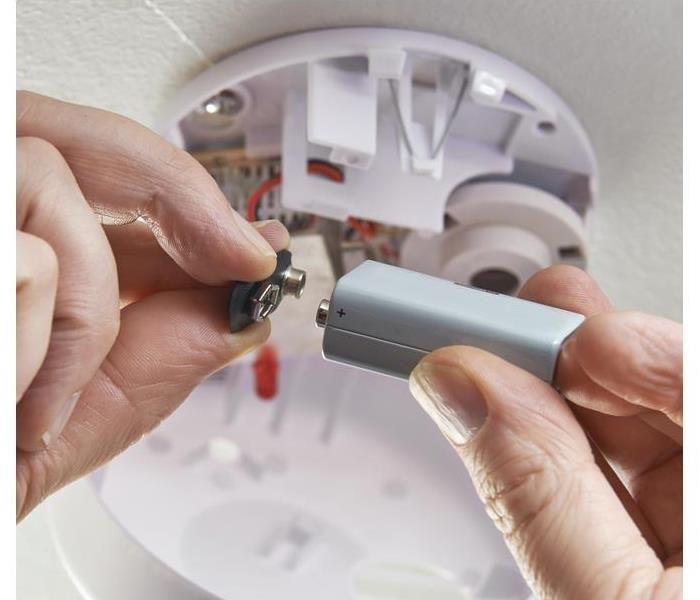 Change the batteries of your smoke alarm every six months.
Change the batteries of your smoke alarm every six months.
Conduct Routine Maintenance In Your Fire Alarm
It’s critical for your fire alarm to work when you need it. If the beeping sound goes off in the middle of the night for no foreseeable reason, however, it can be irritating and jarring. Let’s examine a few causes and remedies for the unpleasant noise.
1. Replace the Batteries
One of the most common reasons for a continuous beeping is a battery that is losing its power. It is recommended that the batteries be changed in each alarm every six months. Make sure you switch out the old batteries with properly-placed new batteries so that you know the device is working.
2. Clean the Alarms
Dust can settle into the crevices of your alarm and cause it to malfunction. If it beeps continuously, open the fire alarm and gently blow out the dirt with a small air blower. Since lodged dirt can also make the device stop working altogether, get in the habit of checking it for dirt and dust every few weeks. One of the last things you want to deal with is smoke damage in your Canton, GA, home, so it’s important to stay vigilant.
3. Reset the Device
Resetting the alarm will sometimes stop it from beeping. At the circuit breaker, turn off the power to the alarm. Carefully remove the device from the wall mount. After unplugging the power supply and removing the battery, hold the test button down for about 20 seconds. Replace the battery and plug the power supply back in. Once you have restored the power at the circuit breaker, reattach the alarm to the wall mount.
If your alarm malfunctions during a fire, the resulting fire damage should be addressed quickly. Water and smoke can cause severe damage, so call a fire restoration service right away to inspect your home.
Make sure to conduct routine maintenance on your fire alarm, and it should serve you well for several years.
Some Basic Information on a Commercial Generator
3/30/2021 (Permalink)
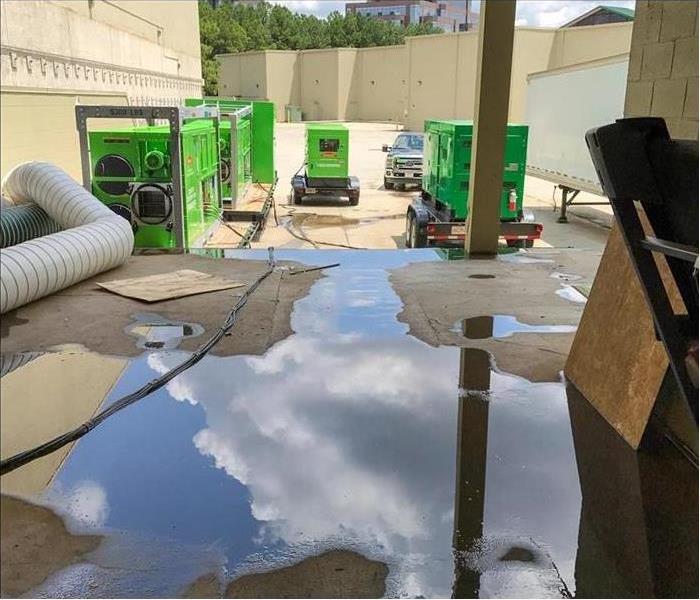 A trusted restoration franchise will respond quickly to clean the property.
A trusted restoration franchise will respond quickly to clean the property.
Basic Information On A Commercial Generator
You have probably experienced a power outage as a result of a powerful storm. If this happens in your home, being without power is a significant inconvenience. A power outage can cause food to spoil in your refrigerator and it can make your home too cold or too warm depending upon the season. If the power goes out in your business in Hickory Flat, GA, the potential problems are magnified. With a commercial generator, you have the ability to limit the impact of losing power. Unlike many home generators, a commercial unit can be permanently installed and will automatically kick in to create backup power.
Safeguard Your Entire Operation
You will have a choice of how much backup power your commercial unit will produce. This will depend in part on your operations. If you have a large amount of inventory that must remain frozen, you will want to make sure you can do this with your generator. The benefits to your operations of reliable backup power include the following:
- Keeps the lights on
- Allows the HVAC system to keep pipes from freezing
- Keeps IT systems running
- Protects security features of your building
- Increases worker and customer safety
Some companies might only require a small unit to keep priority systems running. This still allows for lighting and heating systems to work until full power returns.
Protect Your Company's Assets
If you do purchase a commercial unit, it is important to be able to avoid generator problems. With care and regular maintenance, you should be able to eliminate such issues as wet-stacking, improper fuel, coolant leaks and neglected maintenance. A local storm remediation company can also protect your property by mitigating storm damage. Highly-trained workers will arrive on-site in a matter of hours with the equipment and expertise to remove water and quickly restore your building. A trusted restoration franchise is just as important as a commercial generator to the vitality of your business.
Tips for Restoring Items After a Flood
3/9/2021 (Permalink)
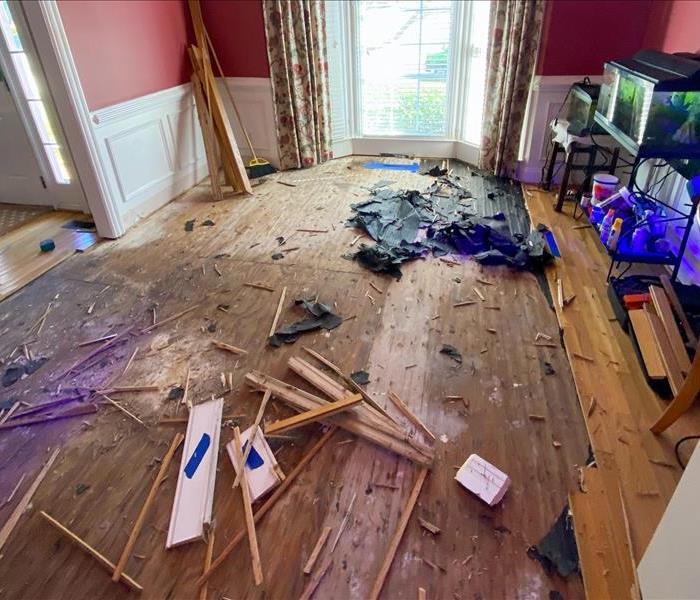 A home damaged by water damage in Free Home, GA.
A home damaged by water damage in Free Home, GA.
Tips for Restoring Items After a Flood
When your home in Free Home, GA floods, you may fear that everything is a total loss. It is disheartening enough when replaceable items are ruined, but losing priceless family heirlooms can be devastating. Fortunately, flood restoration experts can often salvage items that have damage from water in the home.
Protection
You can do your part to save your family's treasures. Start by separating damp items:
- Place in dry, open boxes or envelopes
- Remove pictures from saturated albums carefully
- Label boxes containing broken pieces of the same item
Treat your possessions gently, as water from a broken pipe makes them significantly more vulnerable to irreparable damage. Keep them out of direct sunlight, as this can cause them to fade. If you are unsure about how to handle a particular item, set it aside in a safe place and wait for the specialists to address it.
Drying
One of the first steps of the mitigation process is to remove all the water in the home. Technicians use industrial pumps to extract standing water and debris, and they discard ruined materials. You can increase air flow by turning on fans and decrease humidity with a dehumidifier. The specialists inspect each item to see if there is a way they can save it. If it can be salvaged, the structure of the piece determines the method used to do so.
Cleaning
It's possible that, in addition to getting wet, your belongings also are dirty from the flood. Specialists use the appropriate cleaning process for the material of each item. For example, most textiles can be restored with dry cleaning. Once the structure has been repaired and cleaned, you can remove all restored items back into your home.
Water in the home is not an automatic total loss. Before you throw out your beloved possessions, consult the specialists in charge of mitigating the damage. They may be able to save more than you think.
Why SERVPRO Is a Great Franchise To Join
2/19/2021 (Permalink)
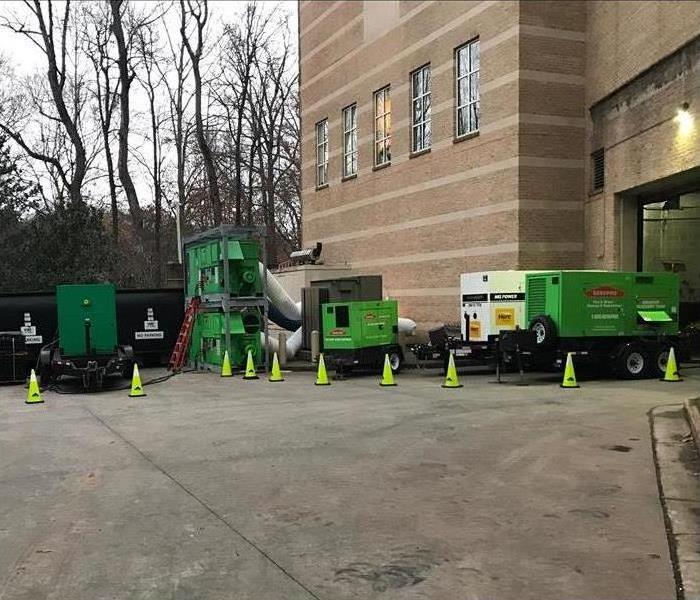 Fast response for your commercial property.
Fast response for your commercial property.
Current economic conditions have pushed many into making career changes. Additionally, people occasionally shift their occupations for personal reasons rather than financial ones. Whatever the cause for leaving your job behind, one attractive employment alternative is opening a SERVPRO franchise. Now could be the perfect time to consider joining North America’s premier disaster recovery experts.
Services Provided by SERVPRO
SERVPRO handles many types of disaster scenarios, including those relating to:
As the preferred vendor for a great number of insurance companies, SERVPRO repairs both commercial and residential sites in more than 1,700 territories. Join their team and make Woodstock, GA the latest area they serve.
Reasons To Join SERVPRO
Becoming the owner of a locally owned business that is also a nationally respected chain comes with an automatic level of prestige. In existence since 1967, many citizens are already aware of the quality work SERVPRO provides. Those whose buildings require restoration will naturally be inclined to trust your SERVPRO franchise the instant it opens.
SERVPRO is also certified for delivering COVID-19 cleanings. In light of recent history, this is an expanding field unlikely to diminish any time soon. Locations ranging from restaurants and offices to schools and public spaces need viral pathogens eradicated. With over 50 years of experience conducting biohazard decontaminations, SERVPRO is positioned to become the go-to source for cleansing spaces everywhere.
As certified disaster recovery specialists, SERVPRO’s reputation remains top-notch. The training they administer and the equipment they provide make them fantastic at what they do. By joining SERVPRO, these advantages instantly become yours as well.
The decision to open a SERVPRO franchise is a smart move for many. If you wish to go into business for yourself but want to avoid the headache of creating a company from scratch, joining this already established organization could be the path that best matches your desires and situation.
How To Prevent Clogs in Old Drain Pipes
2/11/2021 (Permalink)
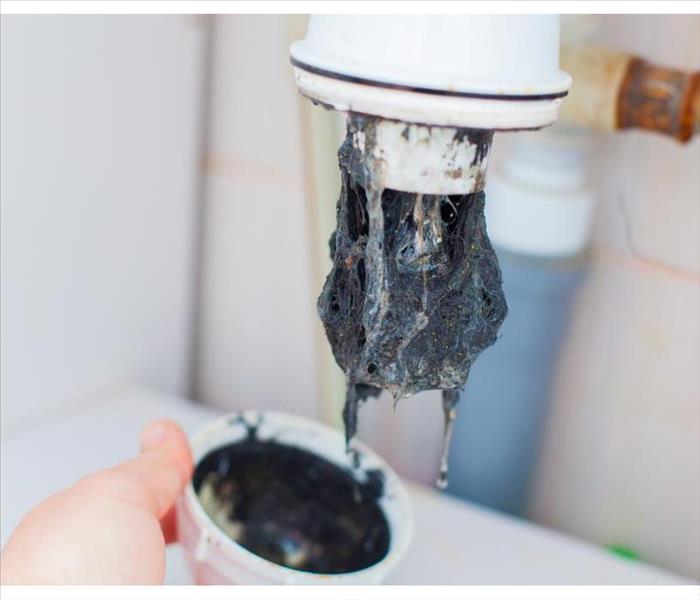 Keep your drains clear of food and hair.
Keep your drains clear of food and hair.
An old rental building in Woodstock, GA comes with plenty of charm. It may even be cheaper than an ultra-modern premise is. However, a property that was erected decades ago may also have a lot of problems. Clogged pipes, for instance, are particularly common in older structures. That is because these buildings usually feature polybutylene pipes that wear down over time.
Clogs are not just minor inconveniences, either. A major backup could cause a flood that necessitates water damage restoration services. You thus need to perform extra maintenance on your pipes to keep them functioning properly.
Enzyme Treatments
A clog can occur in a sink or in the main plumbing line. To prevent both types of blockages, follow the below steps:
1. Run Hot Water
Enzymes do their best work in warm temperatures. You should thus run the water in the sink until the temperature increases.
2. Make and Pour Enzymes
Enzymes are essentially powdered bacteria that destroy soap scum and other debris in the drain. Add water to liven up the dry enzymes and then pour them down the drain.
3. Turn on Water
Let the enzymes sit in the polybutylene pipes overnight. Then pour boiling water into the drain to flush away the remaining gunk.
Repeat this process in each sink at least once per month. You should also clear your main lines by flushing one cup of enzymes down the toilet. Do this four days in a row during each season.
Preventing Clogs
Besides using enzymes, you can also prevent clogs by keeping the pipes clear of debris. This means installing a lint catcher in any laundry room and making sure your tenants keep the drains clear of food and hair.
Tree roots are common sources of clogs, as well. You may want to chop down troublesome trees or use root killers in your toilets.
Polybutylene pipes in older properties can wear down or clog easily. Limit mainline blockages and use regular enzyme treatments to prevent severe water damage in your building.
6 Pieces of PPE for Mold Removal
2/2/2021 (Permalink)
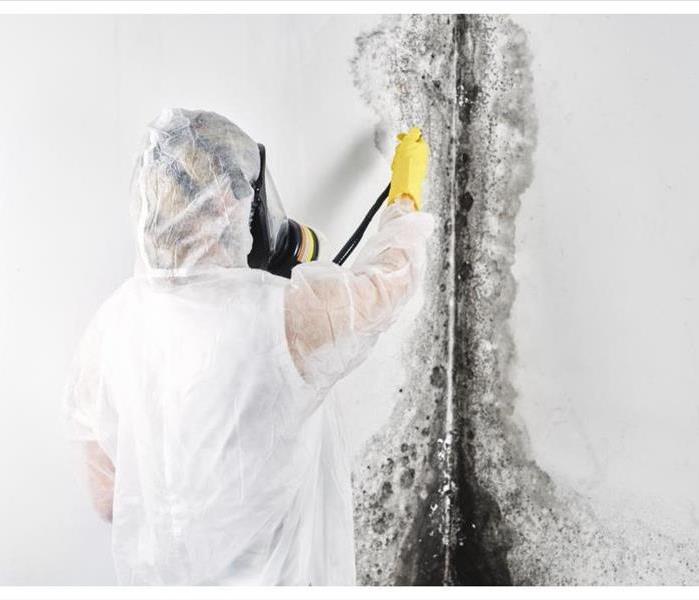 Personal protective equipment is necessary to protect the professionals when they remove mold from a location
Personal protective equipment is necessary to protect the professionals when they remove mold from a location
6 Pieces of PPE for Mold Removal
Personal protective equipment (PPE) is necessary to protect the professionals when they remove mold from a location. This is because mold spores can easily become airborne, inhaled, and travel to other sites. Fortunately, the professionals in Woodstock, GA wear all the PPE they need.
1. Gloves
Disposable latex gloves are necessary to keep the hands free from hazards during the cleanup process. If an individual is allergic to latex, they must wear nitrile or vinyl gloves instead.
2. Hair Covers
A disposable hair cover is going to resemble a shower cap. They prevent mold spores from landing in a worker's hair and being transferred to another location. These covers will be removed before the individual leaves the worksite and replaced with a new one anytime someone enters the contaminated area.
3. Shoe Covers
Shoe covers are disposable booties that go over work boots. They are also necessary to ensure mold is not tracked outside of the worksite. Like hair covers, they will be removed anytime someone leaves the contaminated area and replaced with a fresh pair when they return.
4. Goggles
Safety goggles are worn to protect the eyes. This is important because it keeps the eyes from being scratched or otherwise damaged. They also keep harmful chemicals from splashing into the eyes. These are necessary, and you will see them on any restoration team.
5. Masks
A face mask or respirator is worn to keep mold spores and debris from being inhaled. This is often considered one of the most important pieces of equipment used to protect someone that is removing mold.
6. Tyvek Suits
Some professionals choose to wear disposable Tyvek suits over their regular clothing. This is typical for commercial jobs. It makes it easy for workers to remove their clothing before leaving a site. This prevents them from spreading mold spores to the rest of the building.
A professional remediation company will only undertake a remediation job involving mold growth once they have donned the proper PPE. They will come prepared with all of these safety items. This keeps the workers safe. It also prevents mold spores from traveling to other locations.
3 Steps To Take If You Smell Natural Gas
2/2/2021 (Permalink)
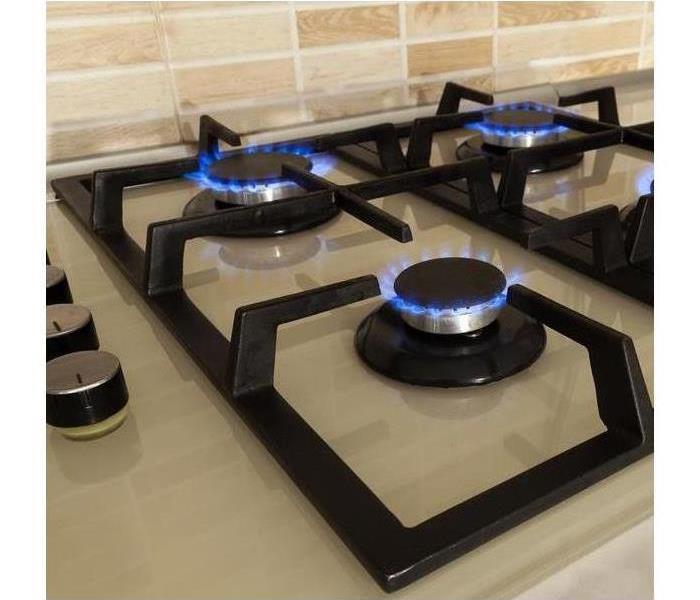 A gas leak can introduce a large quantity of flammable gas into a residence in a matter of minutes
A gas leak can introduce a large quantity of flammable gas into a residence in a matter of minutes
3 Steps to Manage a Gas Leak
A natural gas leak can introduce a large quantity of flammable gas into a residence in a matter of minutes. Homeowners can take three steps to manage or resolve this problem. If a gas leak is ongoing, a homeowner may prevent a gas fire by shutting off the main valve and contacting the gas company or 911 from a safe distance.
1. Don't Turn On Lights or Electrical Appliances
Electric lighting or appliances may generate sparks that can cause a gas explosion. If a homeowner or other residents are searching for the source of a gas leak, battery-operated flashlights are safe to use.
2. Find the Source or Shut Off the Gas
The burners on a gas stove and oven can be accidentally turned on and cause natural gas to build up in a home without a leak. Homeowners may also want to check the condition of gas lines and connections leading to other appliances. If a leak is present or the source of the gas is not evident, a homeowner may reduce the risk of a gas fire by turning off the valve on the gas meter.
3. Ventilate and Evacuate
Ventilation is necessary whether the underlying issue has been solved or the gas has temporarily been shut off. A high concentration of gas can endanger utility workers and appliance repair specialists as well as residents. In the meantime, every occupant of a residence should evacuate.
Once a homeowner evacuates, he or she should assess the situation. If a leak is present from any source, it is advisable to contact the gas company in Woodstock, GA. This may also be an appropriate scenario in which to call 911, particularly if the risk of a gas fire or explosion is high. If a fire or explosion occurs, a homeowner should also contact an insurance company and a mitigation and restoration service.
How To Choose Storm Shutters for Your Home
1/15/2021 (Permalink)
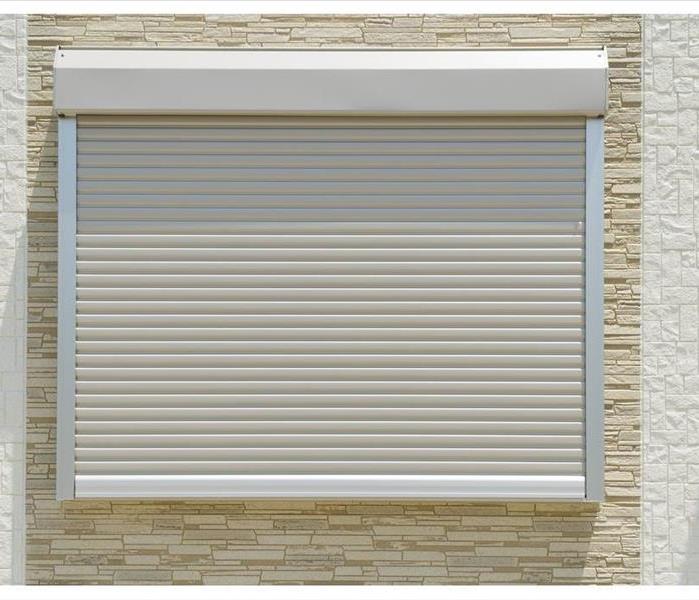 Roll down shutters installed in a Woodstock, GA home
Roll down shutters installed in a Woodstock, GA home
Types of Storm Shutters
If you live in an area that regularly experiences high winds, hurricanes, and tornadoes, such as Woodstock, GA, you may consider adding storm shutters to your home. One reason that people choose not install them is because of the high upfront cost. While these shutters can be pricier than others initially, the trade-off in a lower insurance bill, fewer repair costs, and the safety of your family members can outweigh the initial sticker shock. While there is a broad range of hurricane shutters to choose from, here are a few types with high, middle, and low pricing.
Motorized Hurricane Shutters
When you're ready to go all out to protect your home from high winds, motorized hurricane shutters are the way to go. Installing the shutters and motors will run between $6,000 and $10,000, depending on the size of your home. If your home has high windows, or you're concerned about your ability to properly place or close other types of window protection, a motorized option removes those barriers.
Roll Down Shutters
Roll down shutters sit comfortably in the middle of the range of options. Installed permanently above each window, roll down shutters deploy via a hand or motorized crank, travel down a track, and bolt at the bottom of the window. This style typically costs between $1,700 and $4,000.
Accordion Shutters
Short of nailing plywood over your windows, accordion shutters are the most cost-effective option. Running between $1,200 and $2,400, these shutters live in boxes on either side of the window and when opened, fold over to meet in the middle where you can secure them.
Hurricane shutters don't prevent damage from high winds if they aren't properly installed or secured. If your home does experience storm damage, a water damage remediation professional can help to get the repair process underway.
Despite high upfront costs, storm shutters can help to prevent more extensive damage that could be caused without them.
4 Times You Need to Replace Your Carpet
12/28/2020 (Permalink)
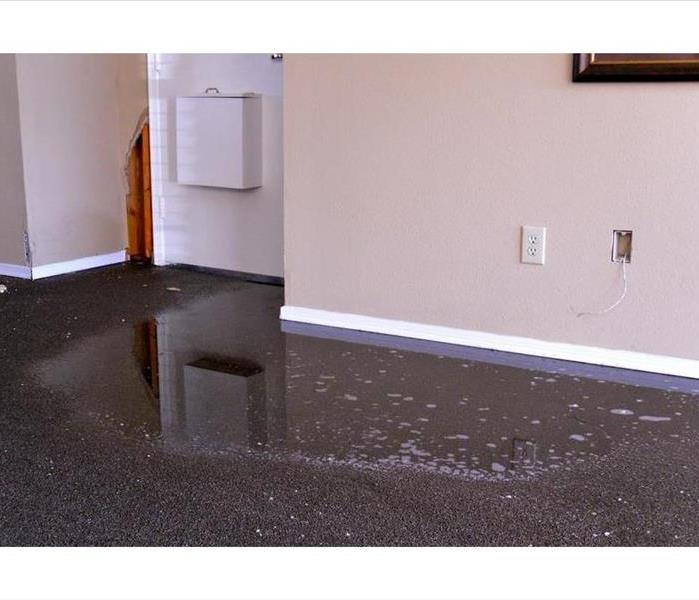 Damaged carpet floor
Damaged carpet floor
Here Are Some Times When You Need To Replace Your Rug
While regular maintenance can extend your rug's life, every carpet is going to need to be replaced sooner or later. Sometimes, it is obvious that the rug in your Woodstock, GA home needs to be replaced.
1. When It Is Stained
If a pipe break or other water damage has got you covering stains with armchairs, it is time for a new rug. Typically, the qualified remediation professionals will tell you that you need carpeting after water damage. However, if they don't or if your carpeting has other types of stains, it is time for a new rug.
2. When It Gets a Rip
That remediation after a pipe break may have led to rips in your rug. You shouldn't have to move your furniture over the rips or be embarrassed to show off your rug. If you notice tears, your rug is too far gone, and you need a new one.
3. When It Smells
If you start to notice a funny smell emanating from your floor, you should give it a good cleaning. If the smell doesn't go away, it means that it is permanent and you need a new rug.
4. When It Gets Wet
A pipe break or small water spill can cause your rug to get wet. This can lead to mold spores growing in the floor which you walk on and lay on. To keep your home healthier, you should replace a rug any time it gets wet.
Whether a restoration processed put a hole in your rug or you noticed a peculiar smell coming from your floor, it is time to get a new rug. Remember, cleaning can only get rid of some of the stains and smells. If you notice any of the signs above, it is time for a new rug.
3 Tips for Protecting Your Business From Fire Damage
12/28/2020 (Permalink)
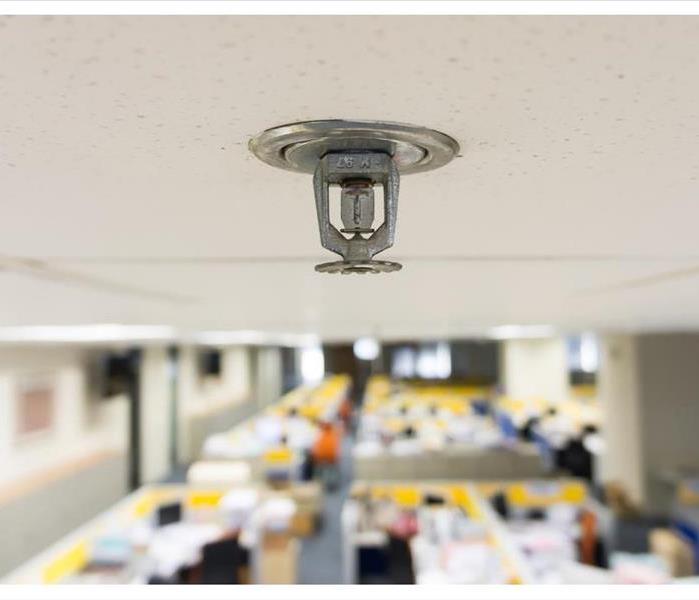 Install a fire sprinkler system in your business
Install a fire sprinkler system in your business
These Three Tips Can Help You Protect Your Business From A Fire
According to The Hartford, about 10% of small businesses suffer a fire loss with an average cost of about $35,000 per claim. Proper fire preparation is the key to reducing the chance of a fire occurring and mitigating the amount of damage.
1. Check Your Fire Extinguishers
Fire extinguishers are one of the most valuable tools for disaster preparation. Fire extinguishers can be used to put out small, localized fires before those fires can spread to other areas. However, to be an effective tool, the extinguishers need to be inspected and maintained according to the fire code in Woodstock, GA. Additionally, employees should be trained on how to properly use them.
2. Install Fire Sprinklers
Another valuable fire preparation tool is a fire suppression or fire sprinkler system. These systems are required by law in some places. Even when not required, they can be worth installing because they can automatically detect and extinguish small fires before those fires can get worse and help mitigate larger fires until the fire department can extinguish them.
3. Keep Your Business Clean
Train your employees to dispose of waste, such as boxes and piles of paper, properly, rather than piling them up on your property where they can provide more fuel for a fire and increase fire damage. Additionally, advise employees not to block walkways, stairways and fire escapes. Clutter in these areas can make it difficult for employees to evacuate during a fire emergency. If your business needs cleaning after a fire event, a fire restoration company can assist you with the process.
Many businesses will experience at least one fire during their time in operation. These fire preparation tips can help you reduce the chances of a fire occurring and mitigate the damage caused by any fires that do start.
What Is Category 1 Water Damage and How Do You Clean It Up?
12/15/2020 (Permalink)
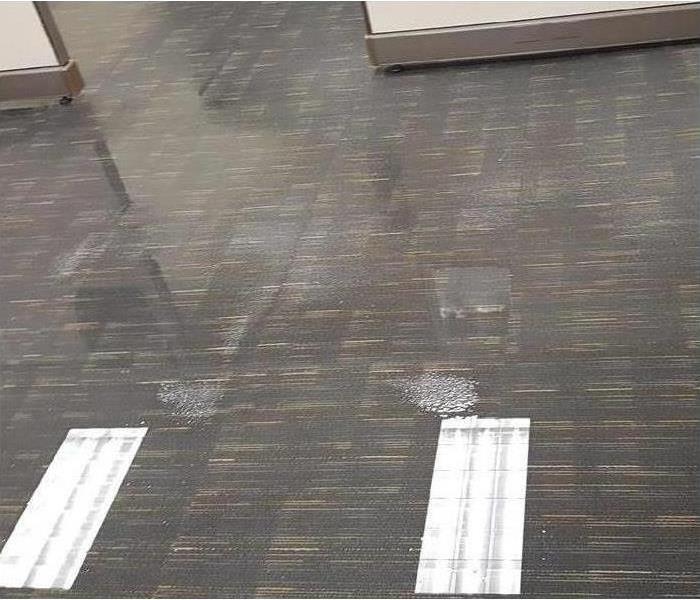 Commercial water damage in Woodstock, GA
Commercial water damage in Woodstock, GA
What Is Category 1 Water Damage?
It is never a good thing to find water damage in your building. It doesn't take a lot of water to ruin building materials and personal belongings. Moisture in your facility can also cause mold growth. There are different levels of water damage, with Category 3 being the most severe. If clean water floods your office, it is considered Category 1 damage. It can still be concerning, so prompt cleanup is essential.
A Deeper Look at Category 1 Water
While the worst type of water damage will come from sewer lines or toilet overflows, Category 1 water will come from clean water sources. These will include the following:
- The main supply line into your building
- Bathroom sink faucets
- Broken pipes
- Overflowing or ruptured water fountains
The Problems This Flooding Can Cause
Category 1 water does not have contamination, so coming into contact with or ingesting in shouldn't pose health risks. Still, the water can damage items in your Woodstock, GA, building such as merchandise, office equipment, workstations and personal items in offices. If you do not remove the water and clean the area soon enough, you may not be able to salvage these materials.
The Cleanup Process
For minor flooding from a broken pipe or other issues, you may be able to remove the water with a wet vacuum. However, more widespread flooding requires the experience and skill of a professional flood cleanup company. A technician will first extract all standing water in your building. To prevent mold and mildew growth, the company will then use high-powered fans to dry the affected area. Sanitizing all surfaces will also ensure that the building is clean and ready for your safe return.
Experiencing a flood in the workplace, even with clean water, can be devastating. Make sure you get in touch with a qualified team of professionals so you can get your office back in working order.
Will My Building Have Mold After a Roof Leak?
12/8/2020 (Permalink)
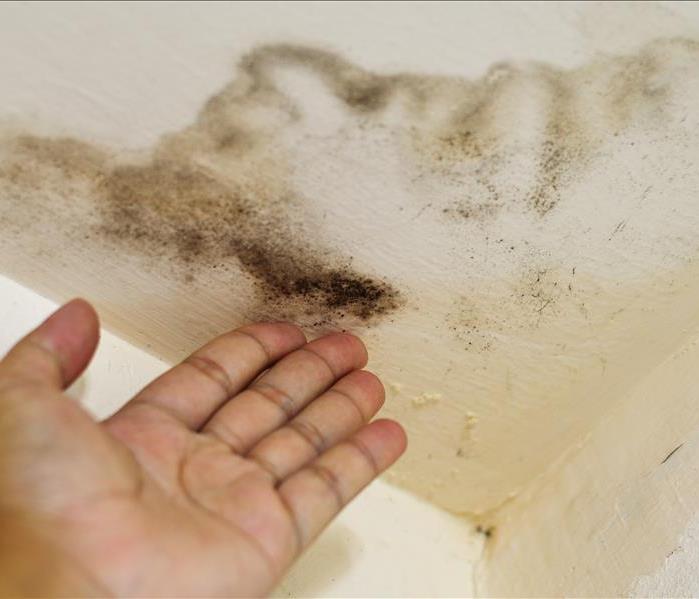 Black mold damage in a Woodstock, GA building
Black mold damage in a Woodstock, GA building
Will My Building Have Mold After a Roof Leak?
If your business has experienced roof damage in Woodstock, GA, you may wonder if black mold or other molds might be growing due to a ceiling leak. Mold grows quickly in a damp environment and should be remediated as soon as possible.
How Long Does It Take for Mold to Grow?
Mold spores exist everywhere naturally and are present in normal levels both inside and outside. Mold spores enter a building through various ways:
- HVAC systems
- Windows
- Doors
- The clothing of people coming in
When high humidity or moisture is present, mold can grow on almost any surface and it can begin to spread within 48-72 hours. A commercial building restoration service can help you begin remediation as soon as possible.
Steps to Remediation
The first thing to do is to make temporary repairs. Tarps, boards, or other materials may be used to stop the roof leak until permanent repairs can be made.
A building restoration company will assess the damage and amount of mold. Mold can be present in insulation or other places where it is hard to see. The company will use special equipment to locate hidden black mold or other types of mold, along with moisture or water sources that might not be visible.
The next step is to contain the mold, using physical barriers, air purifiers, or other equipment as needed. Once mold is contained, cleanup can begin using antimicrobial or antifungal treatments. Any porous materials that are infested may need to be removed. If mold has grown inside the building due to a ceiling leak, other surfaces like carpet and drywall may need cleaning or replacing. A building restoration service can work with you to repair or remodel areas affected by mold.
Prompt action is the key to preventing the spread of black mold or other molds after a roof leak. Stopping the water flow and removing moisture quickly will go a long way in preventing further damage.
How To Prepare Kids for a Fire Emergency
12/8/2020 (Permalink)
 Kids' safety is an integral part of any fire escape plan
Kids' safety is an integral part of any fire escape plan
How To Prepare Kids for a Fire Emergency
As a parent, you work hard to keep your kids safe. When was the last time you performed a drill or went over an escape route? Every kid's safety plan should include well-planned and practiced fire emergency steps.
Create a Plan
Develop fire escape plans as a family. Find all of the possible exits and mark them on a map of your home. Create routes from each bedroom so that each child has his or her own escape plan. Decide on a meeting place outside of the house as a family. Allowing kids to help with the planning helps them learn and memorize what to do if there is a home fire.
Practice
Performing fire drills at least twice a year will keep your family up to date on kids safety. When practicing, treat the drill as though it were real. Set off smoke alarms and have your children use the following fire safety tactics:
- Roll out of the bed and flat on their stomachs onto the floor
- Crawl on their forearms and knees to the nearest exit
- Check doors with the back of their hands to see if they are hot before opening them
- Close doors behind them to prevent spread and fire damage
With practice, children can use these methods to avoid as much fire and smoke exposure as possible in a real emergency.
Prep Your Home
Preparing your kids means preparing your home, too. Install smoke alarms in every bedroom and outside of all sleeping areas. Change the batteries every six months. Periodically check that windows are easy to open and that exit doors are easy to access. Finally, keep a list of emergency numbers, including the local fire department in Woodstock, GA, and memorize them with your kids.
Kids' safety is an integral part of any fire escape plan. With proper planning and practice, your family can rest easier knowing that you are all prepared.
What To Expect During Mold Assessment
11/24/2020 (Permalink)
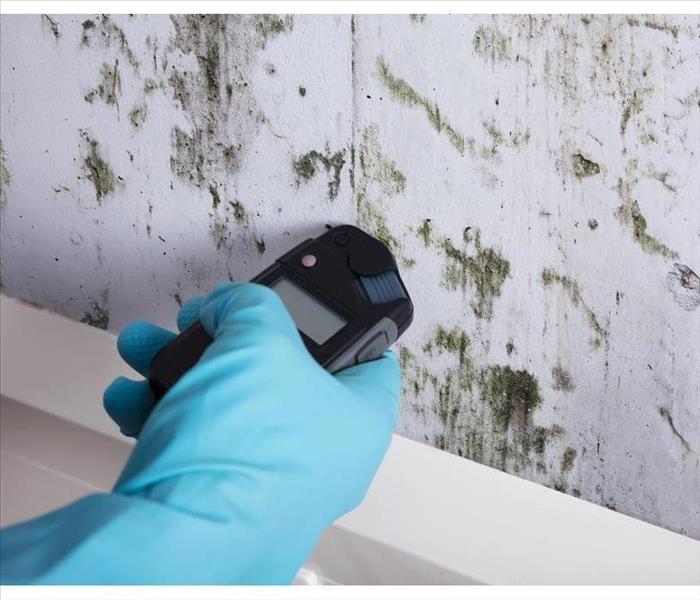 Mold testing service in Woodstock, GA
Mold testing service in Woodstock, GA
What To Expect During Mold Assessment
If you think you may be in need of a mold assessment at your Woodstock, GA home, then it’s recommended that you contact a local mold remediation service. These professionals can help identify if mold is present, where it is growing, and restore your home. Here are some steps you can see these professionals take as they work on your home.
1. Mold Testing
In many cases, the professional working on your home can perform several tests to help locate and identify if mold, mildew, or black mold, is present. These tests can involve taking air samples, using adhesive strips to remove residue from a surface, and taking samples of potentially affected materials. If these tests come back positive for mold, the restoration service can then begin containing the area.
2. Containing the Area
Containing the affected area is another important aspect of a mold assessment, as it helps prevent spores from spreading throughout the house. In most cases plastic sheeting with be used along with a ventilation system that is used to reduce airflow. The team will also wear protective equipment while working in the space including masks, gloves and clothing covers.
3. Remediation
After the area is contained the remediation process can begin. In some cases, the contaminated materials will need to be replaced with new. Additionally, during this process the source of any water damage should be located, and the necessary repairs made as well. Doing so may help prevent future problems from occurring. Restoration may also involve item cleaning and sanitation using a variety of methods depending on the type of object being restored.
During the mold assessment, you may see your restoration team test for the presence of mold. Once the results of these tests are in they can contain the spaces that do have mold growth and begin the restoration process. This may include removing contaminated materials and replacing it with new.
Three Types of Contaminated Flood Water
11/23/2020 (Permalink)
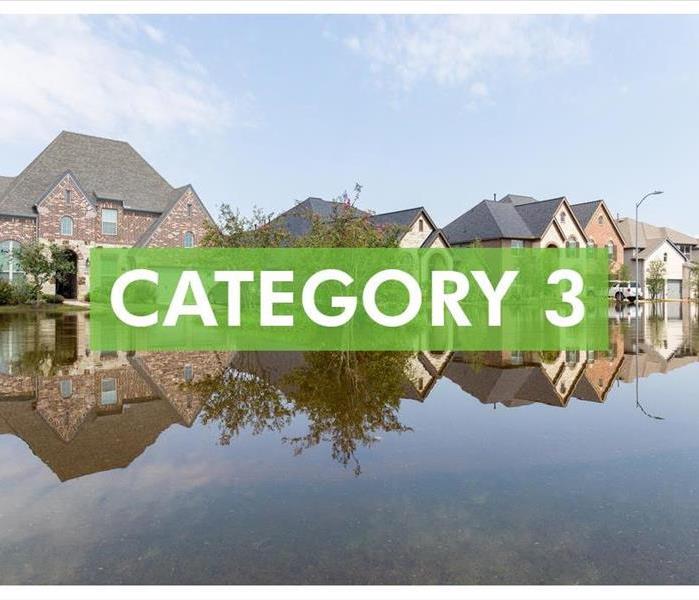 Sewage and flooding are considered Category 3
Sewage and flooding are considered Category 3
Different Types Of Contaminated Water
Water damage can wreak havoc on your Woodstock, GA home. That being said, not every home flood is the same. Flood water is categorized by the types of contaminants present. Understanding the differences among the different types of contaminated water can help you remediate the damage more effectively.
1. Clean Water Floods
Like their name implies, Category 1, or clean water floods, are categorized by an absence of contaminants. As the least dangerous types of floods, they typically originate from a supply line burst, a shower leak or some other type of clean water source. Just because these floods aren't as dangerous doesn't mean that they shouldn't still be taken seriously. A clean water flood can transform into a Category 2 flood if left untreated for too long.
2. Gray Water Floods
Gray water floods are also known as Category 2 floods. This flood contains mildly contaminated water, but nothing that could pose a biohazard risk. These floods are often caused when household appliances malfunction and flood, such as dishwashers and laundry machines. If left untreated for longer than 48 hours, a Category 2 flood will quickly become a dangerous Category 3 flood.
3. Black Water Floods
Category 3 floods, or black water floods, are the most dangerous of all. They are categorized by the presence of biohazards, such as human or animal fecal matter, raw sewage and dangerous chemicals or pesticides. You should never attempt to resolve a Category 3 flood by yourself, due to the possible health risks. Instead, you should contact water damage professionals as soon as you can. These floods are usually caused by toilet overflow, sewage back flow or a a flooding riverbank.
All types of floods are capable of inflicting serious amounts of damage. That being said, it's still important for you to learn the differences between the various types of contaminated water. Make sure to contact flood remediation experts for assistance, no matter which type of flood you're currently dealing with.
How To Check Your Sprinkler System
11/11/2020 (Permalink)
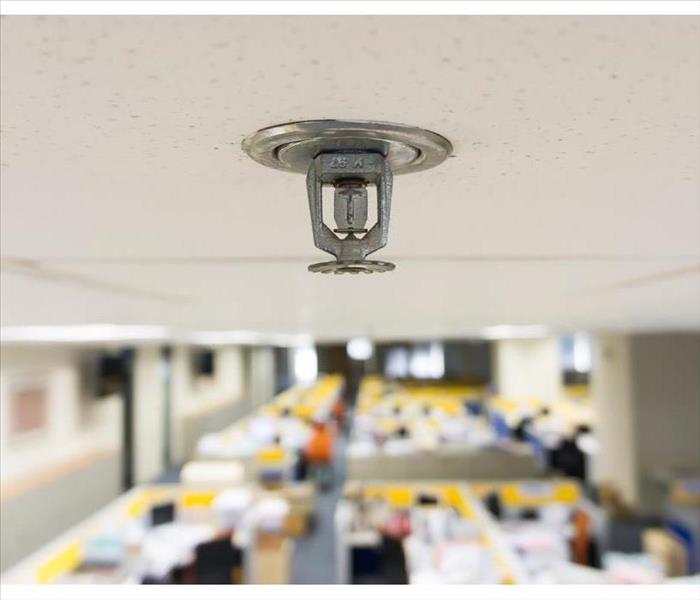 Maintaining a working fire sprinkler is requisite for any business
Maintaining a working fire sprinkler is requisite for any business
How To Check Your Sprinkler System
Fire sprinkler systems are critical to keeping your employees safe and slowing destruction from out-of-control blazes. Before an inferno takes hold in your office, check that everything is functioning properly through the use of a water pressure gauge.
Sprinkler System Failures
Your fire suppression system may be faulty for any number of reasons, including:
- Improper valve installation
- Extensive building construction
- Alterations to the water distribution system
- Component damage
Whatever the cause for improper operation, lacking adequate water protection with your building afire is a nightmare scenario nobody should endure. An easy fire sprinkler cleanup in Waleska, GA, remains far preferable to needing a commercial fire and smoke restoration service to rehabilitate extensive destruction.
Sprinkler System Gauge Selection
There are two types of gauges with which you can test your fire sprinkler. Dry gauges are the most common and employ a spring-loaded mechanism to operate. Liquid gauges incorporate glycerin to deliver measurements that are more precise.
Older gauges occasionally contain flaws such as fluttering pointers or leaks. Ones suffering from these or any other imperfections must be discarded and new ones purchased. Check that whichever version you choose has Underwriters Laboratory and Factory Mutual approvals, both of which are required by the National Fire Protection Association. These quality seals provide assurance that yours will deliver accurate readouts.
Manufacturers commonly bundle the necessary plug, nipple and 3-way valve along with these devices. If yours lacks the required installation components, consult a professional to be sure you are acquiring ones that reflect the correct measurements. Once in place, the 3.5-inch dial measures both water and air pressure. Research your manual to determine the optimum gauge numbers. If yours falls outside of the acceptable range, promptly hire a repair specialist.
Maintaining a working fire sprinkler is requisite for any business. See that yours is operating properly by selecting and attaching the best gauge for your network and then viewing it regularly.
How To Address Leaking Pipes and Minimize Business Loss
11/11/2020 (Permalink)
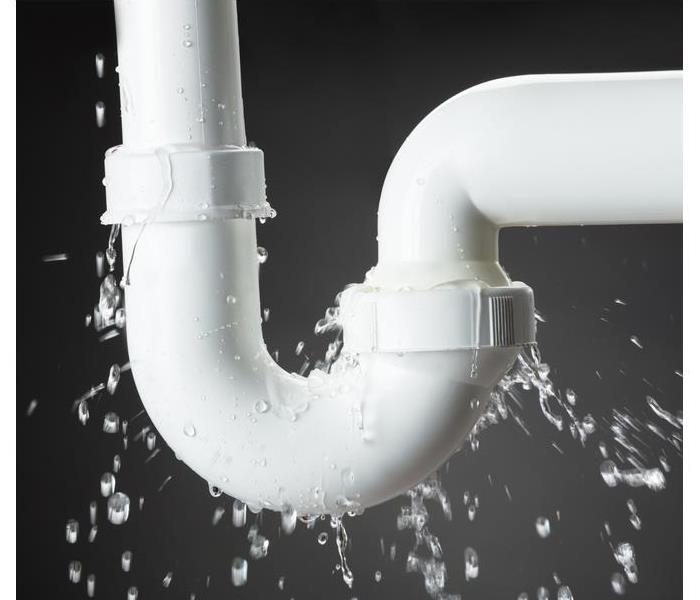 Identify the leak quickly and call professionals to repair the damage
Identify the leak quickly and call professionals to repair the damage
Here Are Four Steps For Handling A Pipe Leak
Flooding can mean big trouble for your business in Acworth, GA if you wait too long to address it. One of the most common causes for business loss is water damage, particularly from leaking and damaged pipes.
If you notice any water leaks in your building, knowing how to respond can severely reduce the damage.
1. Determine the source. Some leaking pipes are easy to spot. Check under sinks in breakrooms, kitchen areas, and bathrooms. Look behind major appliances, such as an ice machine or dishwasher, for signs of accumulating moisture. If you see moisture stains on walls, water may be leaking from a pipe behind the wall. Using a flashlight may make it easier to spot stains and mold.
2. Stop the leak. Once you have identified the source and type of leak, you should stop it and make repairs. Turn off the water to the appropriate area of the building and fix the damaged pipes, enlisting the help of a professional if needed.
3. Remove the water. If you experience flooding from a burst pipe, you should remove any standing water as quickly as possible. Towels can be handy for soaking up excess liquid.
4. Restore the building. When it comes to water, it is best to call water damage restoration specialists. These professionals are specially trained to clean up and restore your business to pre-leak conditions. They use professional equipment to ensure the water is removed, the affected area is thoroughly dried and disinfected, and the impacted materials and structures are repaired or replaced.
If you discover a leak in your building, do not wait for it to get worse. Identify the leak quickly and call professionals to repair the damaged pipes and restore your business. Water damage can intensify quickly, and procrastinating can be a costly mistake.
Flooding Means Dealing with Black Water
11/11/2020 (Permalink)
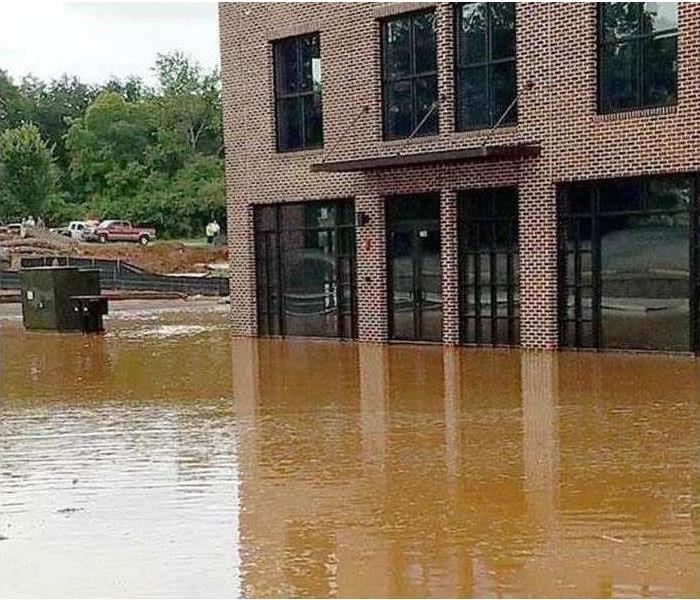 Flooded building in Lebanon, GA
Flooded building in Lebanon, GA
If faced with flooding in your Lebanon, GA, business, the excessive unwanted water can easily make you feel overwhelmed. While it can be easy to focus on the damage, the flood water itself needs to be considered first. There are three classifications of water that are important to understand before diving in to cleanup.
Water Categories
The cause of the water, whether storm damage or leaking pipe, determines how safe the water is to handle. The three categories are:
Clean Water – This is considered safe water that often comes from a faulty appliance, pipe burst, toilet holding tank leak or rainwater.
Grey Water – Although it does not contain fecal matter, this category means that the water has some contaminants. Sources include showers, dishwashers and toilets.
Black Water – This type requires additional safety measures to deal with since it is contaminated with human waste, chemicals, microorganisms and pathogens. Water that enters from outside the building or from the sewer are given this classification.
It is important to understand that even the first two categories can evolve into the third category. The longer water sits, the more likelihood of mold growth.
Call the Experts
Knowing that staying up and running and salvaging items in your property from flood water is essential to success, it can be easy to want to immediately start the cleanup process. When the cause is natural flooding, the mess should be left to a water damage and restoration company. A certified professional will have the tools and techniques to handle the potentially harmful water. From having the proper safety gear to using industrial-grade equipment to extract water to inspecting for signs of secondary damage and much more, a trusted professional can make it “Like it never even happened.” They are also trained to restore belongings, including electronics and document.
Dealing with flood water requires careful consideration before cleanup can even begin. Knowing the categories of water and that help is just a call away can ensure a safe and proper cleanup.
What Not to Do After a Flood
10/20/2020 (Permalink)
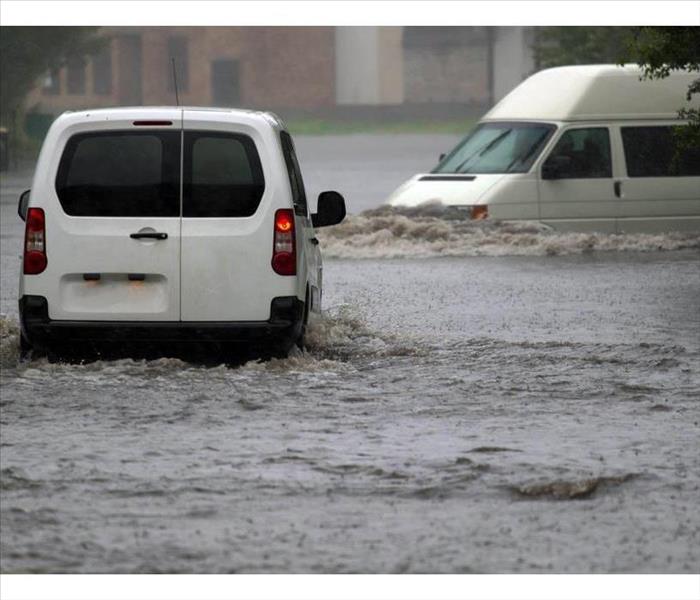 Never drive through a flooded street
Never drive through a flooded street
Avoid The Following If You Have Suffered From Flood Damage
Dangerous flood water can cause problems for anyone, even if you've never experienced a flood before. Knowing the correct, and incorrect, actions to take during and after the incident can, not only save your life but also help you avoid subsequent property damage. Make sure to avoid the following if your home in Holly Springs, GA, has recently suffered from a flood.
1. Never Enter a Moving Flood.
There are a number of reasons why wading or swimming in flood water is a terrible idea. The water could likely contain harmful biohazards or other contaminants. Likewise, it's difficult to tell how quickly the current is moving. It only takes about 6 inches of water to sweep you away.
2. Never Disobey Emergency Response Crews.
First responders, local authorities and other types of emergency response crews exist to help you. Disobeying or ignoring them can put you in danger, as well as make their jobs significantly more difficult. You're better off listening to what they have to tell you and following their directions.
3. Never Touch Standing Water.
Just because the water in your flooded home isn't moving, doesn't mean it's safe. Much like the flood currents, this standing water could contain harmful biohazards. It's also possible that the water could be electrically charged, especially if it has come into contact with an outlet or electronic device.
4. Never Drive Through a Flood.
It only takes about a foot of water to sweep your car away. Avoid catastrophe by simply keeping away from the water to the best of your ability.
5. Never Ignore Water Damage.
All types of floods can cause damage, not just severe ones. After the authorities give you permission to return home, you need to take immediate action to remediate any water damage. Leaving it untreated can cause mold growth and other types of structural damage.
Flood water should never be taken lightly. Staying alert and listening to your local authorities is the best way to keep yourself and your family safe. If your home has suffered damage following a flood, you need to contact flood remediation experts.
Does Homeowners Insurance Cover Mold Damage?
9/30/2020 (Permalink)
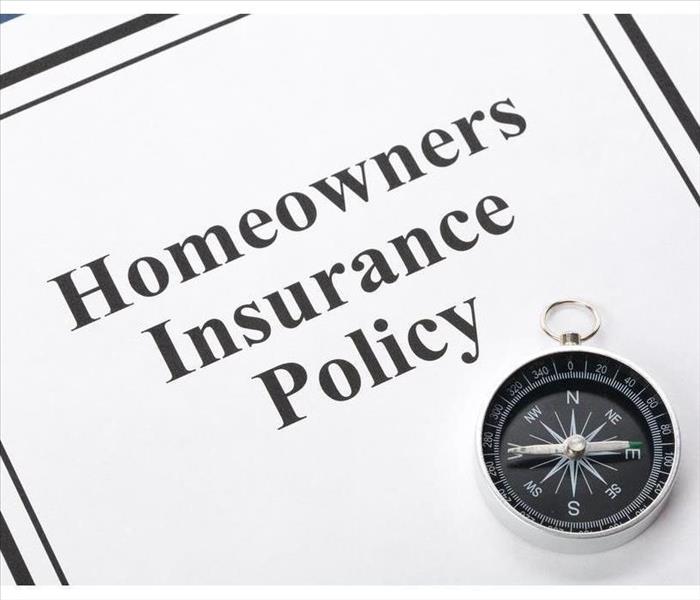 Homeowners insurance can protect your residential property from a lot of different types of damage
Homeowners insurance can protect your residential property from a lot of different types of damage
Is Your Home Protected Against Mold Damage?
Homeowners insurance can protect your residential property from a lot of different disasters and types of damage. Despite how common residential fungus growth is, many insurance policies still don't cover mold damage directly. Read on to see whether your home in Canton, GA, is protected against mold damage.
When You Are Covered
The majority of insurance policies cover mold damage if, and only if, the damage was caused by what's known as a "covered peril." A covered peril is essentially any type of disaster or damage that the insurance policy already covers. Here are a few examples:
- Theft
- Falling objects
- Fire damage
- Vandalism
- Frozen pipes
- Lightning strikes
- Damage caused by vehicles
Because each individual policy is different, it's important to check your insurance policy to see which types of accidents are actually covered. If the fungus growth is a direct result of any covered perils in your policy, then you're covered. However, if the mold is a result of your personal carelessness, or if you leave it unreported for too long, then you likely have to pay for the damage yourself.
When You Aren't Covered
Don't worry if your existing policy doesn't cover mold damage. You always have the option to purchase a separate mold insurance policy, just to be safe. This is a separate policy endorsement that adds mold coverage to your existing homeowners insurance policy. Depending on your home's specific mold risk -- this is determined by where you live, how often you typically deal with mold damage and other various factors -- you may end up paying between $500 and $1,500 annually for separate mold coverage.
Fungus growth is a very common occurrence that the majority of homeowners do have to handle at some point. It may be beneficial to purchase a separate policy endorsement to make sure that your property is covered, just in case your existing policy is reluctant to protect you. If you do discover mold damage in your home, you should contact mold remediation experts immediately.
Are Your Kids Fire-Safety Savvy?
9/18/2020 (Permalink)
 How can you teach your kids about fire safety?
How can you teach your kids about fire safety?
Teaching Your Kids About Fire Safety
No one in Woodstock, GA, likes to talk about the threat of a home fire. However, when it comes to kids safety, talking about a potential emergency teaches children what to do should they actually face a fire crisis. Just like school fire drills, home fire drills give everyone a chance to practice getting out of the house quickly and safely. Family discussions about fire safety help children feel less anxious because they are more prepared. How can you teach your kids about fire safety? Here are a few ideas:
Practice Makes Perfect
Prepare an escape map showing home exits and how to get to them from each child's room.
- Conduct regular fire drills to practice fire escape routes.
- Occasionally challenge kids by pretending certain exits are blocked by smoke or fire.
- Include windows as possible exits. Teach kids how to unlock and open them, and remove the screen.
- If available, show children how to use upper floor rescue ladders.
- Time drills to see if your family can get out of the house and meet at a designated place within 3 minutes.
- Ensure children understand that, once out of a burning building, they must never go back for anything--not even a pet.
What If You Can't Get Out?
Review what to do if escape routes are blocked.
Call 911 or yell from a fully opened window. Stand in front of it and cover your mouth with a (preferably) wet towel or clothing.
Block cracks around doors with sheets or blankets.
Don't hide in a closet or under a bed because firefighters will be looking to get you to safety.
"Stop, drop and roll" if clothing catches fire.
Preparation and practice can save lives and prevent expensive property damage, in addition to other fire restoration expenses. Kids safety depends on their knowledge and know-how. Protect your children by making sure they are fire-safety savvy.
Signs a Mold Inspection May Be Necessary Before Purchase
9/9/2020 (Permalink)
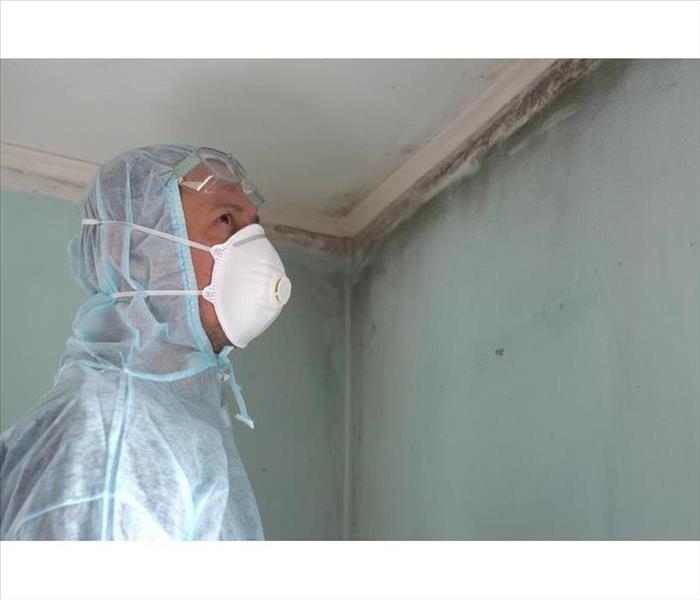 Mold inspection in Nelson, GA
Mold inspection in Nelson, GA
Five Signs That Can Help You Know Your Building Needs Mold Inspection
Purchasing a commercial property is often exciting. However, do not let your excitement overshadow the need for proper and thorough inspections. One inspection many professionals consider, especially when dealing with an older property, is a mold inspection. Most mold remediation companies in Nelson, GA, will explain that a thorough mold assessment is expensive and likely unnecessary unless there is one of the following five signs of damage.
- Signs of water damage
- Discoloration of building materials
- Foundational issues
- Poor seals
- Roof wear
Signs of Water Damage
When walking the property, look for possible signs of water damage. Are wood floors buckled, tiles broken, or missing? Are the ceiling tiles stained? Also, pay attention to the smell of the facility. Does it smell musty? Is the air heavy, thick and humid? All of these issues are potential warning signs of mold.
Discoloration of Building Materials
Pay attention to the color of drywall, ceiling tiles, and carpeting. Is there black staining on anything? Do the stain patterns seem to follow a distinct path or pattern? Staining and discoloration of any kind should be a warning sign of underlying issues and potentially mold.
Foundational Issues
While you may not see any staining or smell any musty odors, look for cracks along the foundation and structure. Cracks may indicate a water entry point, which can result in a mold problem and a need for a mold inspection.
Poor Seals
You will also want to pay close attention to the window and door seals. If the seals are old and cracking or missing, you may have water issues on the property. Water problems are always an indicator of possible mold growth, so look for signs of visible mold.
Roof Wear
Inspecting the roof should also be on your list of to-dos. Any signs of significant roof wear may also indicate the possibility of mold damage.
Purchasing a commercial property should be exciting. However, you need to cover your basis with appropriate inspections. Talk to a general inspector or a mold remediation company about your concerns and the possible need for a mold inspection.
Cleaning Up Your Business After a Pipe Breaks
9/9/2020 (Permalink)
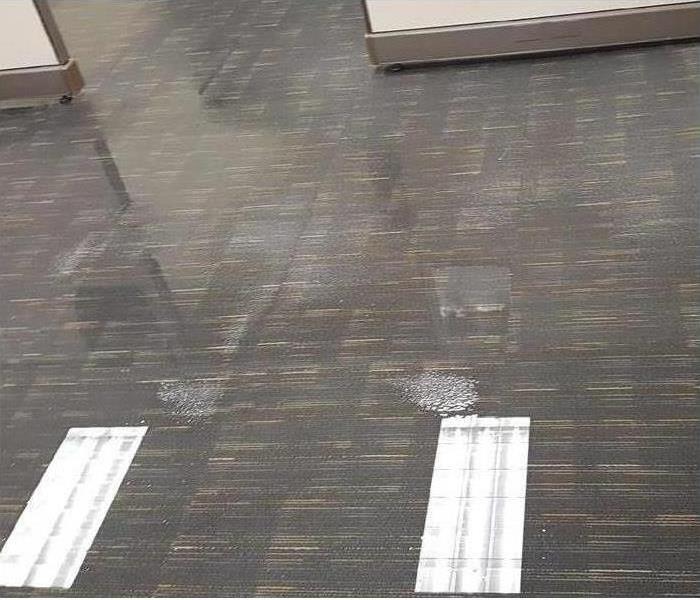 Water damage in an Oak Grove, GA office building
Water damage in an Oak Grove, GA office building
Tips On Protecting Your Business From Water Damage
When the pipes burst, your business in Oak Grove, GA, can quickly be overcome with water and subsequently sustain damage. Sometimes what starts as a small leak can expand into a major problem that requires the help of a water restoration team. There are some tips for recognizing a leak and protecting your company from water damage.
Identifying a Leak or Burst Pipe
There may be evidence of leaky or broken pipes around your business to watch out for, including:
- Wall discoloration
- A musty or mildewy smell
- Dripping sounds
- Puddles of water on the floor
Even if you notice only a small amount of water, get in contact with a water cleanup team immediately. It does not take long for a small crack to turn into a burst pipe and cause extreme water damage to your business. Noticing the signs early can help you protect your business from harm.
Acting After a Pipe Bursts
Sometimes there is no catching the problem until a major accident occurs. If you do experience a burst pipe in your office, there are several recommendations to aid in clean-up.
The water in the building should be completely turned off, and any water on the floors should be cleaned up immediately. Standing water is a breeding ground for mold, and any wet furniture should also be removed to prevent a mold infestation. Fans, mops, vacuums, and other equipment are useful for drying the space. It is important to remove all moisture from the area to prevent any long-lasting damage to your property.
Covering the Cost of Burst Pipes
In addition to having a clean-up team on standby, it is important to have a business insurance policy in place that covers water damage caused by burst pipes. By speaking with your insurance agent, you can make sure that you have the right coverage for this type of liability and that your business is thoroughly protected.
Why Fire Damage in a Canton Department Store Might Start with the Electrics
8/24/2020 (Permalink)
In larger department stores, it is common for relatively powerful lights to remain on throughout the night. The problem with this is that fluorescent lighting produces lots of heat. If electrical components are not regularly checked for faults, placing this kind of stress on the system can lead to disaster.
We are talking about blown fuses and accidental fires. Luckily, SERVPRO knows just how to deal with commercial fire damage in Canton stores. We want to stress that you should always carry out routine maintenance on electrical systems to avoid fires. However, if the worst does occur, you can call our team for help with repairs.
The Immediate Response
Most department stores have sprinkler systems, so it is rare for fire damage to be extensive. Normally, if a spark has developed, it is behind a wall or in the ceiling, because this is where the electrical wires get housed. So, it is common to see localized patches of damage and individual sections of blackened or soot-stained walls.
The Drying Process
If the sprinklers were active at any point, SERVPRO needs to deal with the excess water first. It must be done very quickly because adding water to sooty deposits can increase their acidity. It might make it tougher for the technicians to remove dirt and grime from carpets and other soft fabrics. We advise the disposal of any items of stock which came into contact with water and soot (particularly clothing).
The Targeted Approach
Assuming that the damage is localized and only a part of the wall requires repairs, SERVPRO carefully cuts away the stained or burned plasterboard. It is necessary for gaining access to the wall cavity, and the material gets replaced later.
Axial fans are an excellent way to direct clean, fresh air into the cavity and flush out smoky and ashy residues. In some cases, a HEPA vacuum may be an effective method of cleaning soot out of smaller spaces, but this depends on the level of access.
Smaller, compact ozone generators or dry foggers are the best options when it comes to chasing bad odors out of the wall cavity. Dry foggers disperse an odor neutralizing chemical, but they do it without adding extra moisture to the environment. It is important when working with electrical components.
The Aesthetic Repairs
Once the wall cavity is clean and deodorized, the technicians can bring in a contractor to add fresh plasterboard. It is painted to match the existing department décor and, possibly, treated with a sealant to prevent lingering soot residues from eating through the top surface.
To find out more about the repair services provided by SERVPRO of Cherokee County, get in touch with our team. We serve businesses in the Canton area and can promise a speedy response. Call us 24/7 at (770) 924-3848 for advice and assistance.
3 Things You Shouldn't Do After a Flood
8/7/2020 (Permalink)
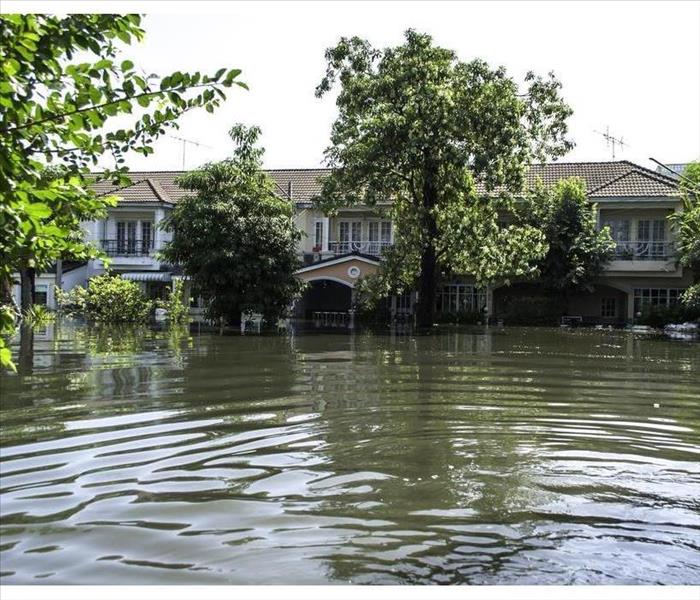 Storm damage in Lebanon, GA
Storm damage in Lebanon, GA
Three Things You Shouldn't Do After A Flood
Storms are especially devastating because they occur with little to no warning. Whether you’ve experienced a storm or are hoping to avoid one, it’s a good idea to know how to handle the situation. A good understanding of storm and water damage will help you minimize the destructive effects on your Lebanon, GA, home. Here are three things you shouldn’t do after flood water has entered your home.
1. Don't Stay In Your Home
After a flood, many homeowners want to stay in their homes to try and reduce the amount of damage. Unfortunately, it may be unsafe to stay in your home due to the following conditions:
- Contaminated water
- Damaged electrical lines
- Bursting dams
- Mold
One of the best things you can do if you have a flooded home is to get out and stay with relatives or in a hotel. You’ll be able to take care of your home better if you have a safe place to stay.
2. Don't Attempt To Clean Up on Your Own
Similar to hiring a professional to handle a plumbing problem in your home, it’s wise to hire restoration specialists who have the tools and training to clean your home. Floodwater can be contaminated with sewage, which is harmful. Local stores may be out of fans, wet-dry vacuums, and generators. Restoration specialists have the trucks, equipment, and knowledge to safely handle any situation in your home. Flooding can easily and quickly cause mold growth; therefore, it’s wise to enlist the help of professionals.
3. Don't Delay in Contacting Insurance Carrier and Mortgage Lender
Some homeowners fail to contact their insurance carrier early on in the process. Unfortunately, this can lead to major delays in a resolution. It’s wise to contact your insurance company immediately to inform them of your situation. It’s also wise to contact your mortgage lender to see if you qualify for deferred payments or waived late fees. Being honest about your situation should help with your circumstances.
If your home is affected by floodwater, don’t stay in your home, clean up by yourself, or delay in contacting your insurance and mortgage companies.
3 Ways to Keep Mildew From Growing On Your Plants
7/29/2020 (Permalink)
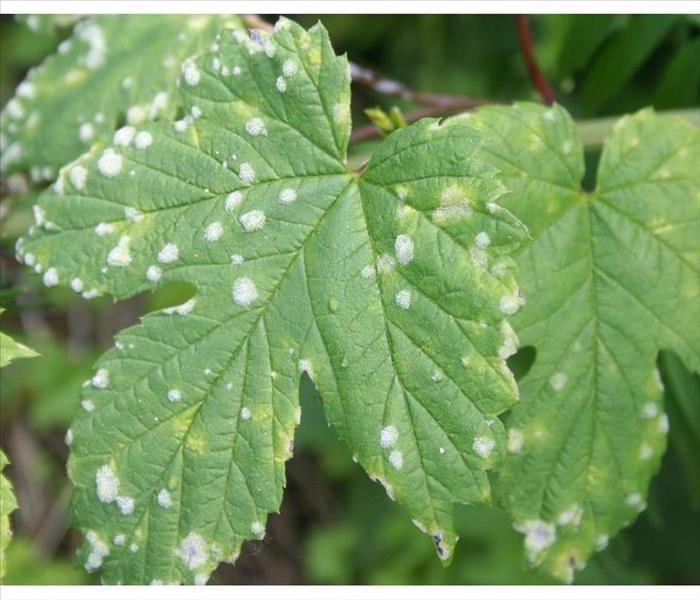 If your plants develop plant mildew, then watering from above can worsen the problem
If your plants develop plant mildew, then watering from above can worsen the problem
Tips To Reduce and Prevent Mildew Growth On Plants
Keeping plants in your Acworth, GA, home is a great way to liven up the space. They can give rooms a brighter appearance, improve your mood and, in some cases, add a pleasant fragrance. Unfortunately, taking care of them isn’t always easy. There are a few problems that you may come across, including plant mildew. This fungus can affect the health of your plants, but the following tips can help reduce growth and prevent its occurrence.
1. Give Your Plants Space
Making sure that your plants have enough room is one way to prevent mildew growth. This allows the air to circulate around the plant and can improve its health. This is particularly helpful when you have many plants close together because mildew on one plant can spread to others. Keeping them further apart can prevent this from happening.
2. Bring Them Outdoors
You may prefer keeping your plants inside the house, but if they have developed a mildew problem, then this might not be the best place for them. In some cases, high humidity in the building can lead to this growth. Bringing the plants outside into a more open environment can keep them free of fungus. The added sunlight can provide benefits as well.
3. Change How You Water Them
You know that watering your plants is important, but you may not know that the way you water them matters as well. If your plants develop plant mildew, then watering from above can worsen the problem. Instead, water from below where the roots are. This will limit the amount of moisture present on the leaves, making it more difficult for the fungus to grow here.
If you notice plant mildew on your indoor plants, this can indicate that there is a high level of humidity. If this is the case, you could possibly have other fungal or mold growth in the house. It may be a good idea to have a mold remediation company perform an inspection as well as any necessary cleanup and repairs.
When Water Damages Join Fire Damages
7/9/2020 (Permalink)
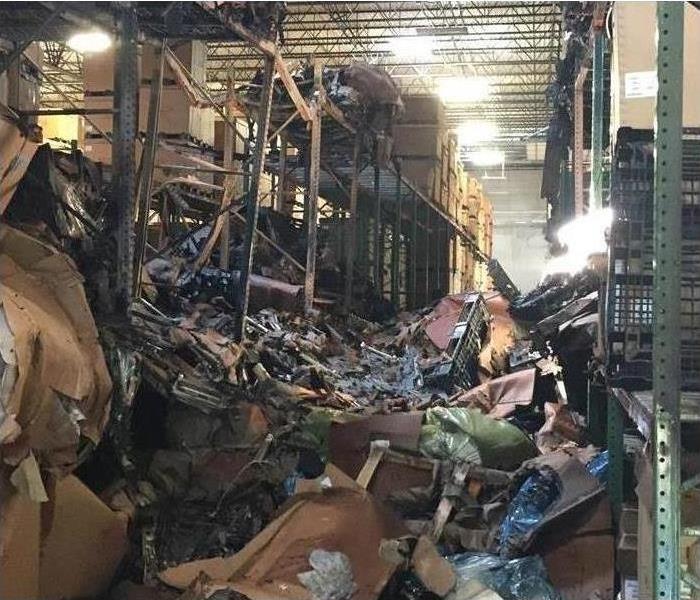 Fire damage in a Waleska, GA
Fire damage in a Waleska, GA
In their efforts to extinguish the fires that threaten commercial properties, firefighters use a lot of water. The powerful water pressure used to put out flames sends moisture into all corners of the building. This quick and decisive response to fire and smoke is often responsible for saving Waleska, GA, businesses, and the contents of commercial buildings. However, it can also add water damage to the fire damage that has already occurred.
Schedule Cleanup and Reconstruction Services
Once the smoke clears and it's safe for you to enter your business, one of your first steps should be to contact fire and water damage restoration professionals. These experts will work through several tasks to make your building look as if the fire had never happened:
- Emergency inspection
- Fire and water damage assessment
- Board-up and roof tarp services as needed
- Water removal and drying
- Removal of smoke or soot stains
- Fire damage cleaning and repair
- Restoration services
Remember that these professionals have received specialized training and have access to other tools to improve the cleaning and restoration processes.
How To Respond While Waiting for Cleanup Crews
It is best to hire professionals for the actual cleanup and repair work necessary after firefighting efforts are complete. However, there are several things you can do to protect your commercial property:
- Contact your insurance company.
- Take pictures of the damage for your records.
- Prevent people from moving through the affected areas.
- Place clean tarps or towels over high traffic areas.
- Turn the water and electricity off to maintain safety in the rest of the building.
- Remove indoor plants and carefully wash off both sides of the leaves.
- Change all HVAC filters.
- Don't try to clean any electrical appliances.
Resist the urge to wipe down surfaces or furnishings. This could lead to the spread of soot contamination or cause further damage to your property. Wait for professionals to arrive.
When firefighters pull out their powerful fire hose, water damage is sure to join the fire damage caused by the flames and smoke at your commercial property. You may have to accept some additional damages, but with the help of professionals, you can expect your property to look as good as it ever did when the dust has finally settled.
An Overview of Category 3 Water Damage
6/12/2020 (Permalink)
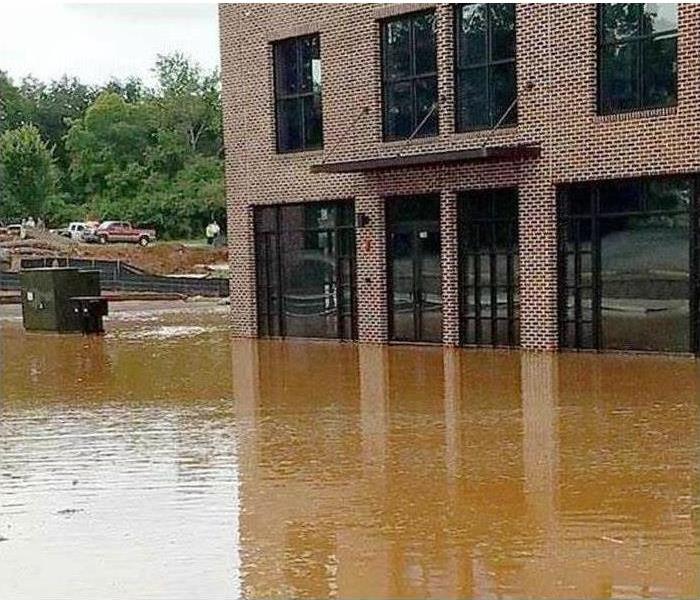 Blackwater is a serious concern in Holly Springs
Blackwater is a serious concern in Holly Springs
It's never a good thing to have water in your Holly Springs, GA, building. However, some types of water damage are worse and more dangerous than others. If you ever have black water in the office, make sure you call a professional water cleanup company right away. This type of water can be harmful if you touch it and deadly if you ingest it.
An Explanation This Type of Water
Floodwater is categorized into three types or levels: 1, 2, and 3. Category 3 water is the most concerning and has the designation of "black." It is so named because it carries sewage, including human waste, along with other harmful contaminants.
How it Gets Here
Many types of floods have Category 1 or 2 water. Category 1 has a clean water source such as from a pipe break. Category 2 water may be from an appliance. Blackwater can find its way into your building from the following sources:
- Toilet overflow
- Sewer backup
- Overflow from a river or canal
The Cleanup
While you can handle small water cleanup jobs in your office, you should leave widespread needs to the pros. Also, in all cases of black water, leave mitigation to a professional sewer cleanup team. Professionals have the skills and experience to remove this water from the building and to handle all aspects of sewage cleanup. The technicians will have the right safety equipment to remove the danger from the area. In addition to cleaning up the water, the team will thoroughly disinfect the area to kill all hazardous material and to prevent the growth and spread of mold. The company will also take care of all your rebuild and restoration needs so you can return to work.
Blackwater is a serious concern. It can be lethal to anyone who comes in contact with it. Stay away from it and leave the cleanup to professional technicians.
We are Cleaning Experts
3/20/2020 (Permalink)
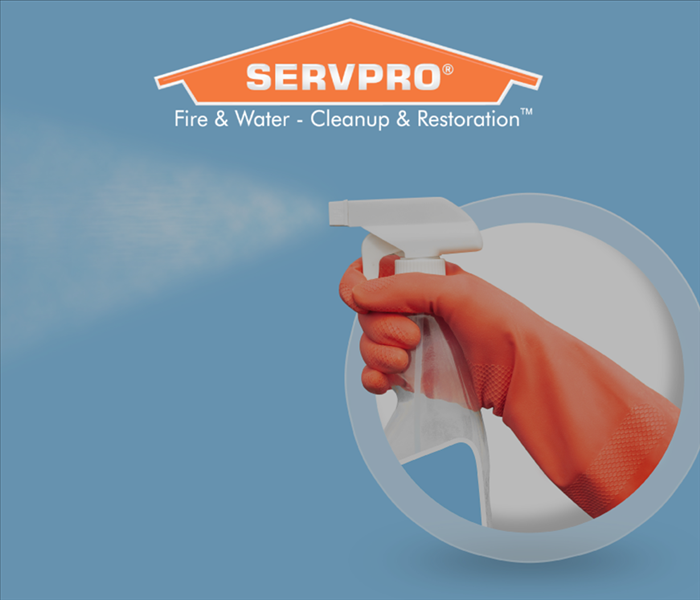 We can handle residential and commercial sanitization jobs.
We can handle residential and commercial sanitization jobs.
SERVPRO is Here to Help during this time of need
During this unprecedented time caused by the global pandemic of coronavirus, this is a reminder to our customers that we are specialists in cleaning services, and we adhere to the highest cleaning and sanitation standards.
Specialized Training
We are prepared to clean and disinfect your home or business, according to protocols set forth by the Centers for Disease Control and Prevention. We have years of experience in dealing with biological contaminants, and we will go beyond the scope of work that regular janitorial staff perform on a daily basis.
The CDC encourages cleaning of high-touch surfaces such as counters, tabletops, doorknobs, light switches, bathroom fixtures, toilets, phones, keyboards, tablets and tables. Other spaces mentioned in the CDC’s guidance for commercial spaces include:
- Kitchen/Food Areas
- Bathrooms
- Schools/Classrooms
- Offices
- Retail Spaces
- Water Fountains
- Shelving/Racks
- Sales Counters
- Carpets and Rugs
- Stair Handrails
- Elevator Cars
- Playground Equipment
- Fitness Equipment
Specialized Products
The CDC recommends usage of a labeled hospital-grade disinfectant with claims against similar pathogens to the coronavirus. Multiple products in the SERVPRO product line carry the EPA-approved emerging pathogens claims. While there is currently no product tested against this particular strain of the coronavirus, we are following all guidelines as provided by the CDC and local authorities.
Call Today for a Proactive Cleaning
If your home or business needs deep cleaning services, call the experts today – SERVPRO of Cherokee County, (770) 924-3848





 24/7 Emergency Service
24/7 Emergency Service


























































